Key Principles of Revenue Management in Travel and Tourism Industry
VerifiedAdded on 2023/02/01
|20
|5496
|32
AI Summary
This article discusses the key principles of revenue management in the travel and tourism industry. It examines revenue management tools to generate and maximize profit. It also reviews the different stages of the HR life cycle within a specific travel and tourism job role and discusses the importance of developing a performance management plan for that role.
Contribute Materials
Your contribution can guide someone’s learning journey. Share your
documents today.
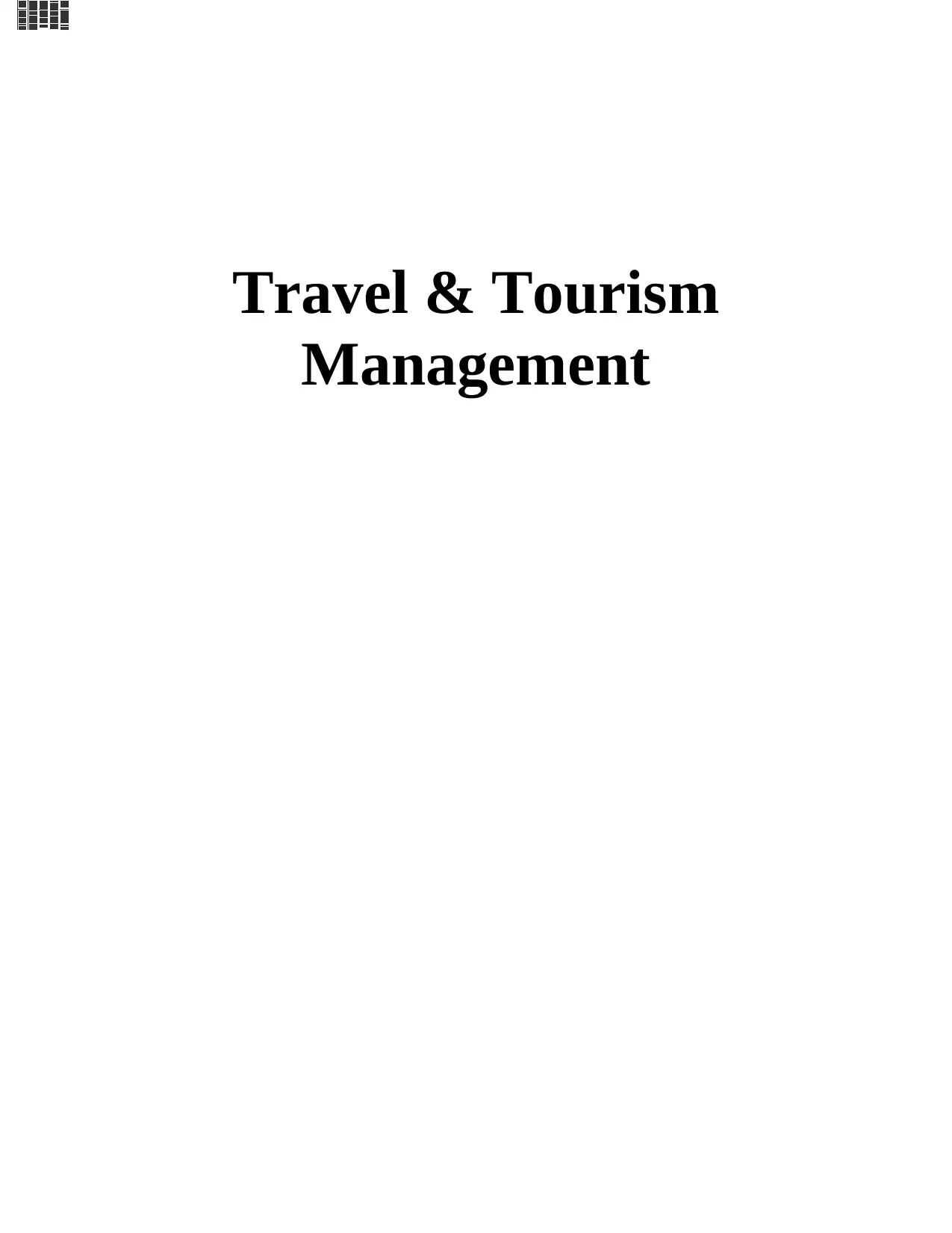
Travel & Tourism
Management
Management
Secure Best Marks with AI Grader
Need help grading? Try our AI Grader for instant feedback on your assignments.
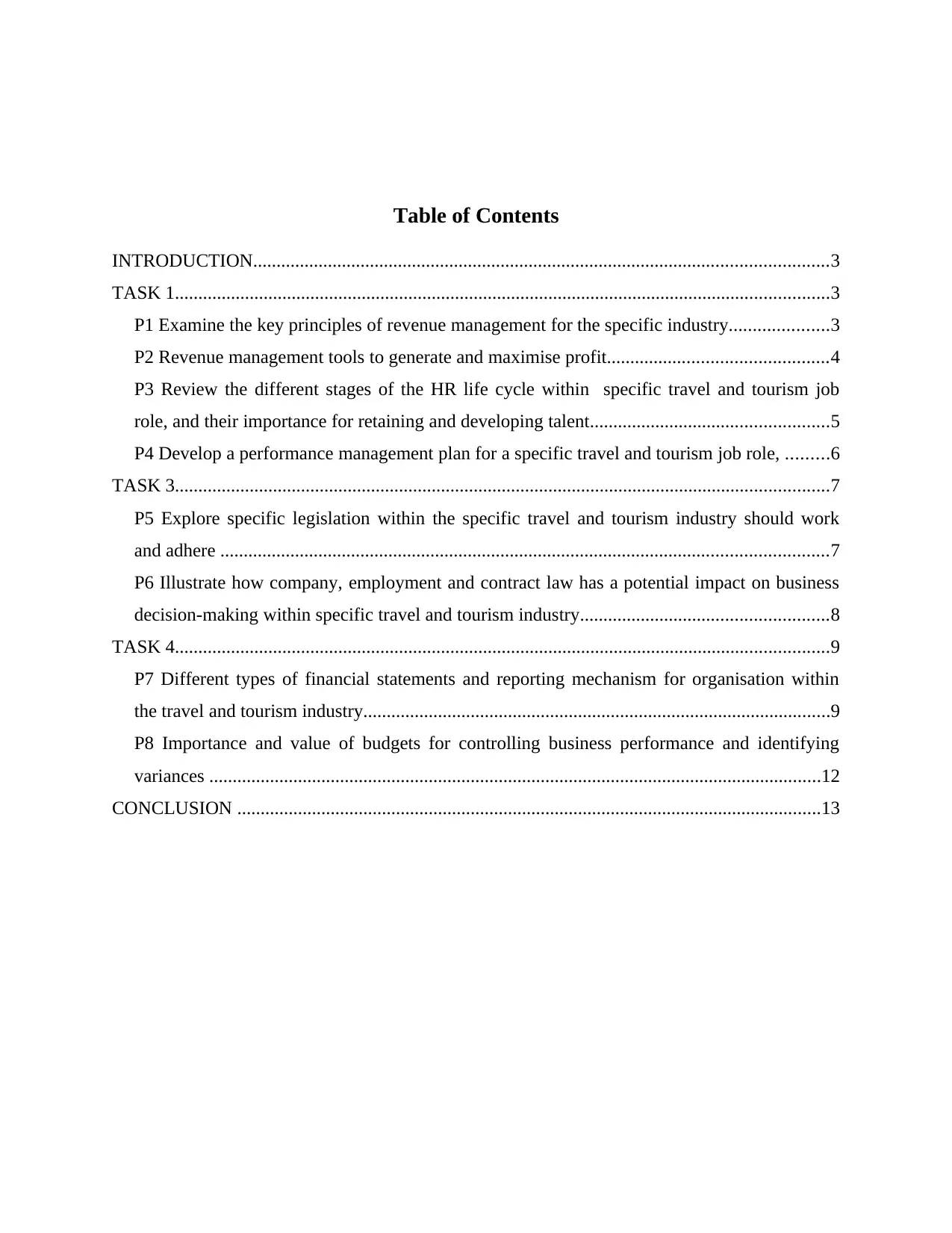
Table of Contents
INTRODUCTION...........................................................................................................................3
TASK 1............................................................................................................................................3
P1 Examine the key principles of revenue management for the specific industry.....................3
P2 Revenue management tools to generate and maximise profit...............................................4
P3 Review the different stages of the HR life cycle within specific travel and tourism job
role, and their importance for retaining and developing talent...................................................5
P4 Develop a performance management plan for a specific travel and tourism job role, .........6
TASK 3............................................................................................................................................7
P5 Explore specific legislation within the specific travel and tourism industry should work
and adhere ..................................................................................................................................7
P6 Illustrate how company, employment and contract law has a potential impact on business
decision-making within specific travel and tourism industry.....................................................8
TASK 4............................................................................................................................................9
P7 Different types of financial statements and reporting mechanism for organisation within
the travel and tourism industry....................................................................................................9
P8 Importance and value of budgets for controlling business performance and identifying
variances ...................................................................................................................................12
CONCLUSION .............................................................................................................................13
INTRODUCTION...........................................................................................................................3
TASK 1............................................................................................................................................3
P1 Examine the key principles of revenue management for the specific industry.....................3
P2 Revenue management tools to generate and maximise profit...............................................4
P3 Review the different stages of the HR life cycle within specific travel and tourism job
role, and their importance for retaining and developing talent...................................................5
P4 Develop a performance management plan for a specific travel and tourism job role, .........6
TASK 3............................................................................................................................................7
P5 Explore specific legislation within the specific travel and tourism industry should work
and adhere ..................................................................................................................................7
P6 Illustrate how company, employment and contract law has a potential impact on business
decision-making within specific travel and tourism industry.....................................................8
TASK 4............................................................................................................................................9
P7 Different types of financial statements and reporting mechanism for organisation within
the travel and tourism industry....................................................................................................9
P8 Importance and value of budgets for controlling business performance and identifying
variances ...................................................................................................................................12
CONCLUSION .............................................................................................................................13
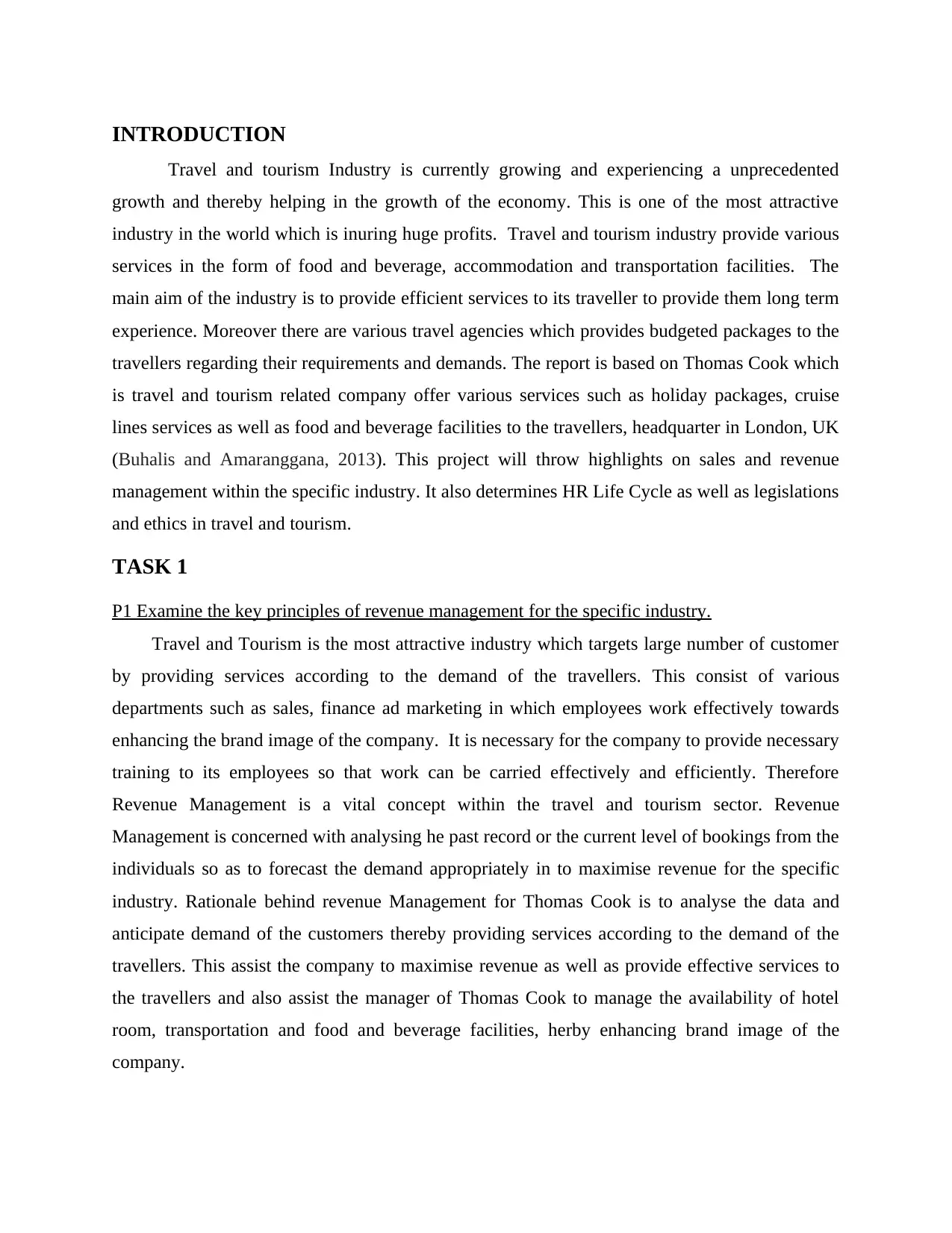
INTRODUCTION
Travel and tourism Industry is currently growing and experiencing a unprecedented
growth and thereby helping in the growth of the economy. This is one of the most attractive
industry in the world which is inuring huge profits. Travel and tourism industry provide various
services in the form of food and beverage, accommodation and transportation facilities. The
main aim of the industry is to provide efficient services to its traveller to provide them long term
experience. Moreover there are various travel agencies which provides budgeted packages to the
travellers regarding their requirements and demands. The report is based on Thomas Cook which
is travel and tourism related company offer various services such as holiday packages, cruise
lines services as well as food and beverage facilities to the travellers, headquarter in London, UK
(Buhalis and Amaranggana, 2013). This project will throw highlights on sales and revenue
management within the specific industry. It also determines HR Life Cycle as well as legislations
and ethics in travel and tourism.
TASK 1
P1 Examine the key principles of revenue management for the specific industry.
Travel and Tourism is the most attractive industry which targets large number of customer
by providing services according to the demand of the travellers. This consist of various
departments such as sales, finance ad marketing in which employees work effectively towards
enhancing the brand image of the company. It is necessary for the company to provide necessary
training to its employees so that work can be carried effectively and efficiently. Therefore
Revenue Management is a vital concept within the travel and tourism sector. Revenue
Management is concerned with analysing he past record or the current level of bookings from the
individuals so as to forecast the demand appropriately in to maximise revenue for the specific
industry. Rationale behind revenue Management for Thomas Cook is to analyse the data and
anticipate demand of the customers thereby providing services according to the demand of the
travellers. This assist the company to maximise revenue as well as provide effective services to
the travellers and also assist the manager of Thomas Cook to manage the availability of hotel
room, transportation and food and beverage facilities, herby enhancing brand image of the
company.
Travel and tourism Industry is currently growing and experiencing a unprecedented
growth and thereby helping in the growth of the economy. This is one of the most attractive
industry in the world which is inuring huge profits. Travel and tourism industry provide various
services in the form of food and beverage, accommodation and transportation facilities. The
main aim of the industry is to provide efficient services to its traveller to provide them long term
experience. Moreover there are various travel agencies which provides budgeted packages to the
travellers regarding their requirements and demands. The report is based on Thomas Cook which
is travel and tourism related company offer various services such as holiday packages, cruise
lines services as well as food and beverage facilities to the travellers, headquarter in London, UK
(Buhalis and Amaranggana, 2013). This project will throw highlights on sales and revenue
management within the specific industry. It also determines HR Life Cycle as well as legislations
and ethics in travel and tourism.
TASK 1
P1 Examine the key principles of revenue management for the specific industry.
Travel and Tourism is the most attractive industry which targets large number of customer
by providing services according to the demand of the travellers. This consist of various
departments such as sales, finance ad marketing in which employees work effectively towards
enhancing the brand image of the company. It is necessary for the company to provide necessary
training to its employees so that work can be carried effectively and efficiently. Therefore
Revenue Management is a vital concept within the travel and tourism sector. Revenue
Management is concerned with analysing he past record or the current level of bookings from the
individuals so as to forecast the demand appropriately in to maximise revenue for the specific
industry. Rationale behind revenue Management for Thomas Cook is to analyse the data and
anticipate demand of the customers thereby providing services according to the demand of the
travellers. This assist the company to maximise revenue as well as provide effective services to
the travellers and also assist the manager of Thomas Cook to manage the availability of hotel
room, transportation and food and beverage facilities, herby enhancing brand image of the
company.
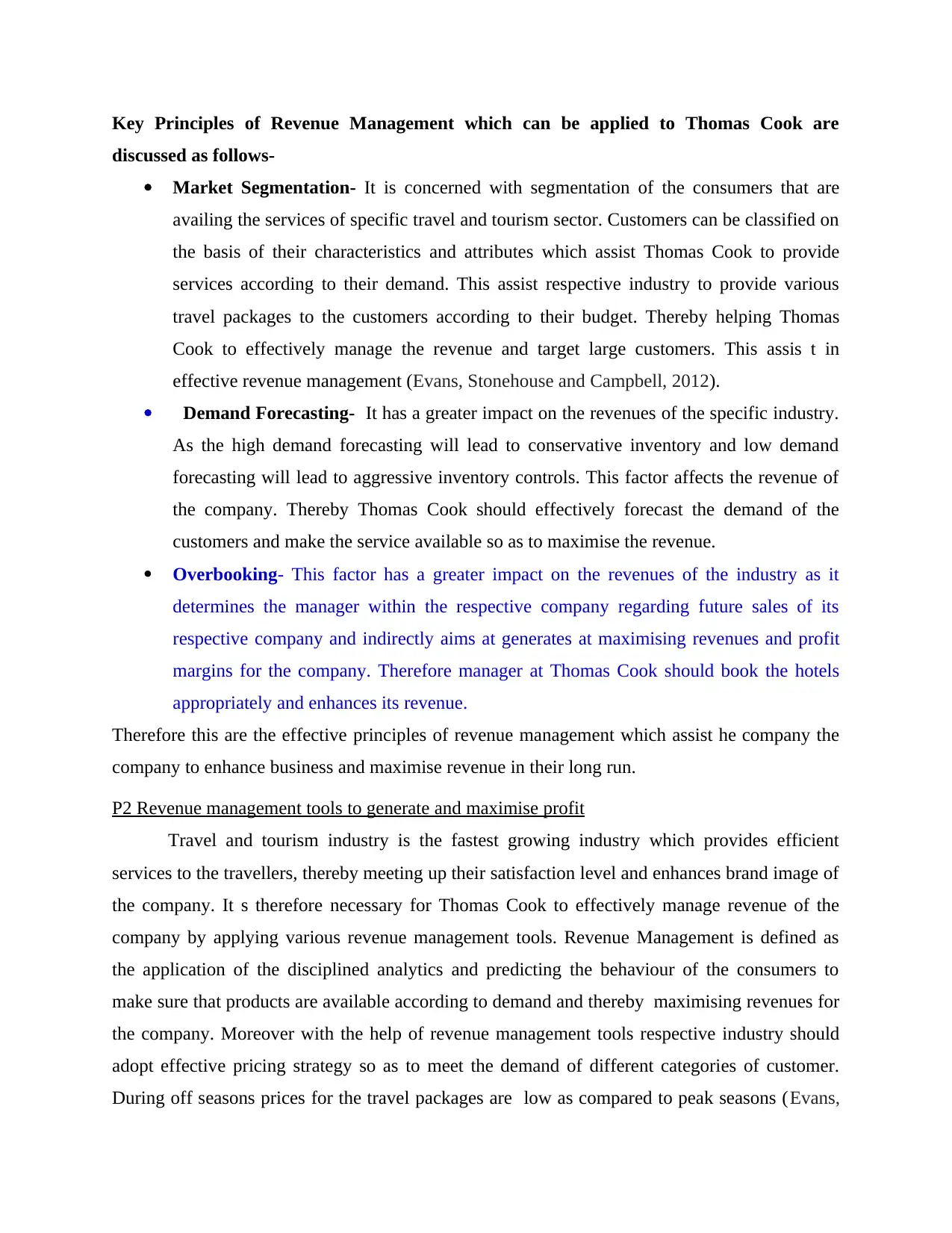
Key Principles of Revenue Management which can be applied to Thomas Cook are
discussed as follows-
Market Segmentation- It is concerned with segmentation of the consumers that are
availing the services of specific travel and tourism sector. Customers can be classified on
the basis of their characteristics and attributes which assist Thomas Cook to provide
services according to their demand. This assist respective industry to provide various
travel packages to the customers according to their budget. Thereby helping Thomas
Cook to effectively manage the revenue and target large customers. This assis t in
effective revenue management (Evans, Stonehouse and Campbell, 2012).
Demand Forecasting- It has a greater impact on the revenues of the specific industry.
As the high demand forecasting will lead to conservative inventory and low demand
forecasting will lead to aggressive inventory controls. This factor affects the revenue of
the company. Thereby Thomas Cook should effectively forecast the demand of the
customers and make the service available so as to maximise the revenue.
Overbooking- This factor has a greater impact on the revenues of the industry as it
determines the manager within the respective company regarding future sales of its
respective company and indirectly aims at generates at maximising revenues and profit
margins for the company. Therefore manager at Thomas Cook should book the hotels
appropriately and enhances its revenue.
Therefore this are the effective principles of revenue management which assist he company the
company to enhance business and maximise revenue in their long run.
P2 Revenue management tools to generate and maximise profit
Travel and tourism industry is the fastest growing industry which provides efficient
services to the travellers, thereby meeting up their satisfaction level and enhances brand image of
the company. It s therefore necessary for Thomas Cook to effectively manage revenue of the
company by applying various revenue management tools. Revenue Management is defined as
the application of the disciplined analytics and predicting the behaviour of the consumers to
make sure that products are available according to demand and thereby maximising revenues for
the company. Moreover with the help of revenue management tools respective industry should
adopt effective pricing strategy so as to meet the demand of different categories of customer.
During off seasons prices for the travel packages are low as compared to peak seasons (Evans,
discussed as follows-
Market Segmentation- It is concerned with segmentation of the consumers that are
availing the services of specific travel and tourism sector. Customers can be classified on
the basis of their characteristics and attributes which assist Thomas Cook to provide
services according to their demand. This assist respective industry to provide various
travel packages to the customers according to their budget. Thereby helping Thomas
Cook to effectively manage the revenue and target large customers. This assis t in
effective revenue management (Evans, Stonehouse and Campbell, 2012).
Demand Forecasting- It has a greater impact on the revenues of the specific industry.
As the high demand forecasting will lead to conservative inventory and low demand
forecasting will lead to aggressive inventory controls. This factor affects the revenue of
the company. Thereby Thomas Cook should effectively forecast the demand of the
customers and make the service available so as to maximise the revenue.
Overbooking- This factor has a greater impact on the revenues of the industry as it
determines the manager within the respective company regarding future sales of its
respective company and indirectly aims at generates at maximising revenues and profit
margins for the company. Therefore manager at Thomas Cook should book the hotels
appropriately and enhances its revenue.
Therefore this are the effective principles of revenue management which assist he company the
company to enhance business and maximise revenue in their long run.
P2 Revenue management tools to generate and maximise profit
Travel and tourism industry is the fastest growing industry which provides efficient
services to the travellers, thereby meeting up their satisfaction level and enhances brand image of
the company. It s therefore necessary for Thomas Cook to effectively manage revenue of the
company by applying various revenue management tools. Revenue Management is defined as
the application of the disciplined analytics and predicting the behaviour of the consumers to
make sure that products are available according to demand and thereby maximising revenues for
the company. Moreover with the help of revenue management tools respective industry should
adopt effective pricing strategy so as to meet the demand of different categories of customer.
During off seasons prices for the travel packages are low as compared to peak seasons (Evans,
Secure Best Marks with AI Grader
Need help grading? Try our AI Grader for instant feedback on your assignments.
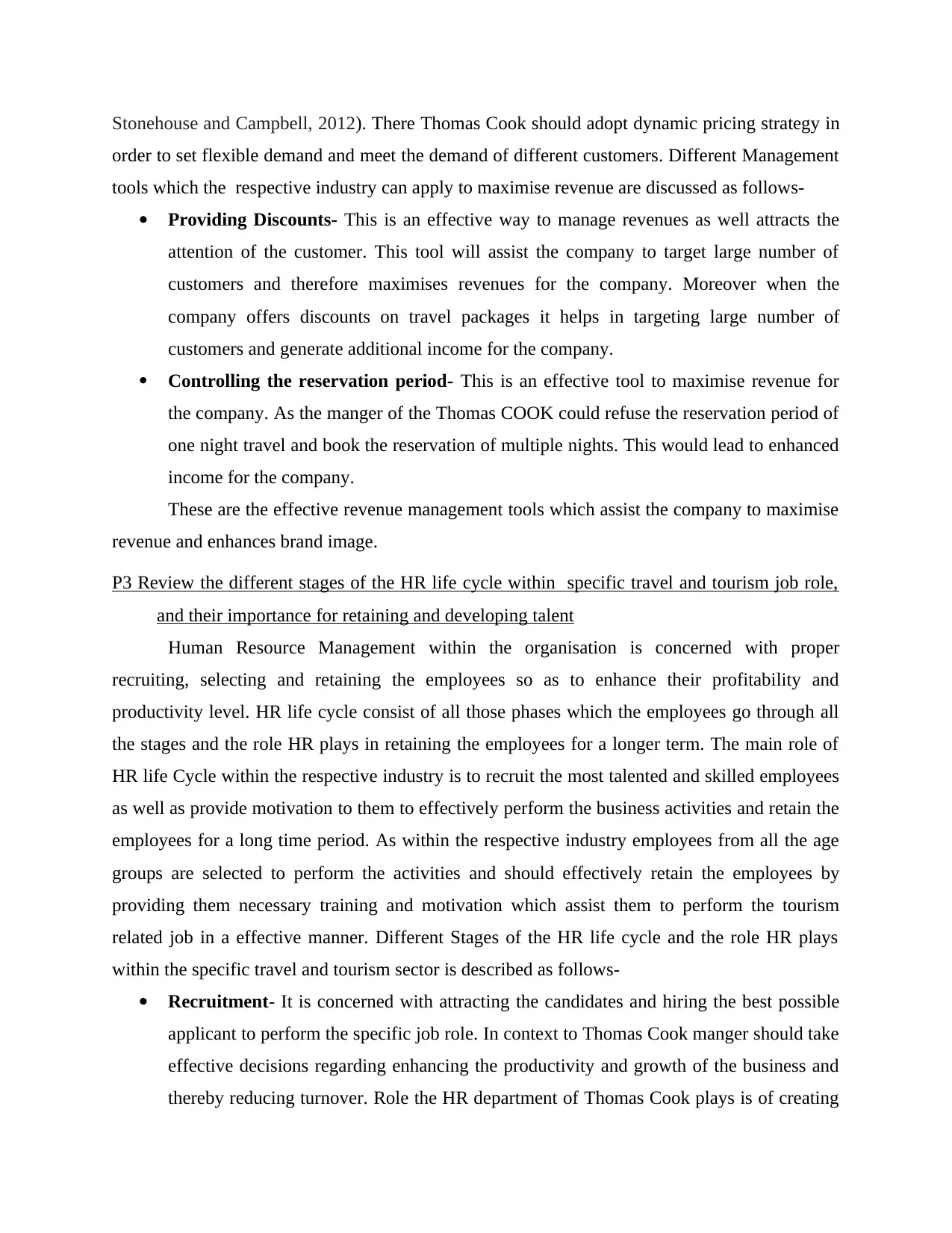
Stonehouse and Campbell, 2012). There Thomas Cook should adopt dynamic pricing strategy in
order to set flexible demand and meet the demand of different customers. Different Management
tools which the respective industry can apply to maximise revenue are discussed as follows-
Providing Discounts- This is an effective way to manage revenues as well attracts the
attention of the customer. This tool will assist the company to target large number of
customers and therefore maximises revenues for the company. Moreover when the
company offers discounts on travel packages it helps in targeting large number of
customers and generate additional income for the company.
Controlling the reservation period- This is an effective tool to maximise revenue for
the company. As the manger of the Thomas COOK could refuse the reservation period of
one night travel and book the reservation of multiple nights. This would lead to enhanced
income for the company.
These are the effective revenue management tools which assist the company to maximise
revenue and enhances brand image.
P3 Review the different stages of the HR life cycle within specific travel and tourism job role,
and their importance for retaining and developing talent
Human Resource Management within the organisation is concerned with proper
recruiting, selecting and retaining the employees so as to enhance their profitability and
productivity level. HR life cycle consist of all those phases which the employees go through all
the stages and the role HR plays in retaining the employees for a longer term. The main role of
HR life Cycle within the respective industry is to recruit the most talented and skilled employees
as well as provide motivation to them to effectively perform the business activities and retain the
employees for a long time period. As within the respective industry employees from all the age
groups are selected to perform the activities and should effectively retain the employees by
providing them necessary training and motivation which assist them to perform the tourism
related job in a effective manner. Different Stages of the HR life cycle and the role HR plays
within the specific travel and tourism sector is described as follows-
Recruitment- It is concerned with attracting the candidates and hiring the best possible
applicant to perform the specific job role. In context to Thomas Cook manger should take
effective decisions regarding enhancing the productivity and growth of the business and
thereby reducing turnover. Role the HR department of Thomas Cook plays is of creating
order to set flexible demand and meet the demand of different customers. Different Management
tools which the respective industry can apply to maximise revenue are discussed as follows-
Providing Discounts- This is an effective way to manage revenues as well attracts the
attention of the customer. This tool will assist the company to target large number of
customers and therefore maximises revenues for the company. Moreover when the
company offers discounts on travel packages it helps in targeting large number of
customers and generate additional income for the company.
Controlling the reservation period- This is an effective tool to maximise revenue for
the company. As the manger of the Thomas COOK could refuse the reservation period of
one night travel and book the reservation of multiple nights. This would lead to enhanced
income for the company.
These are the effective revenue management tools which assist the company to maximise
revenue and enhances brand image.
P3 Review the different stages of the HR life cycle within specific travel and tourism job role,
and their importance for retaining and developing talent
Human Resource Management within the organisation is concerned with proper
recruiting, selecting and retaining the employees so as to enhance their profitability and
productivity level. HR life cycle consist of all those phases which the employees go through all
the stages and the role HR plays in retaining the employees for a longer term. The main role of
HR life Cycle within the respective industry is to recruit the most talented and skilled employees
as well as provide motivation to them to effectively perform the business activities and retain the
employees for a long time period. As within the respective industry employees from all the age
groups are selected to perform the activities and should effectively retain the employees by
providing them necessary training and motivation which assist them to perform the tourism
related job in a effective manner. Different Stages of the HR life cycle and the role HR plays
within the specific travel and tourism sector is described as follows-
Recruitment- It is concerned with attracting the candidates and hiring the best possible
applicant to perform the specific job role. In context to Thomas Cook manger should take
effective decisions regarding enhancing the productivity and growth of the business and
thereby reducing turnover. Role the HR department of Thomas Cook plays is of creating
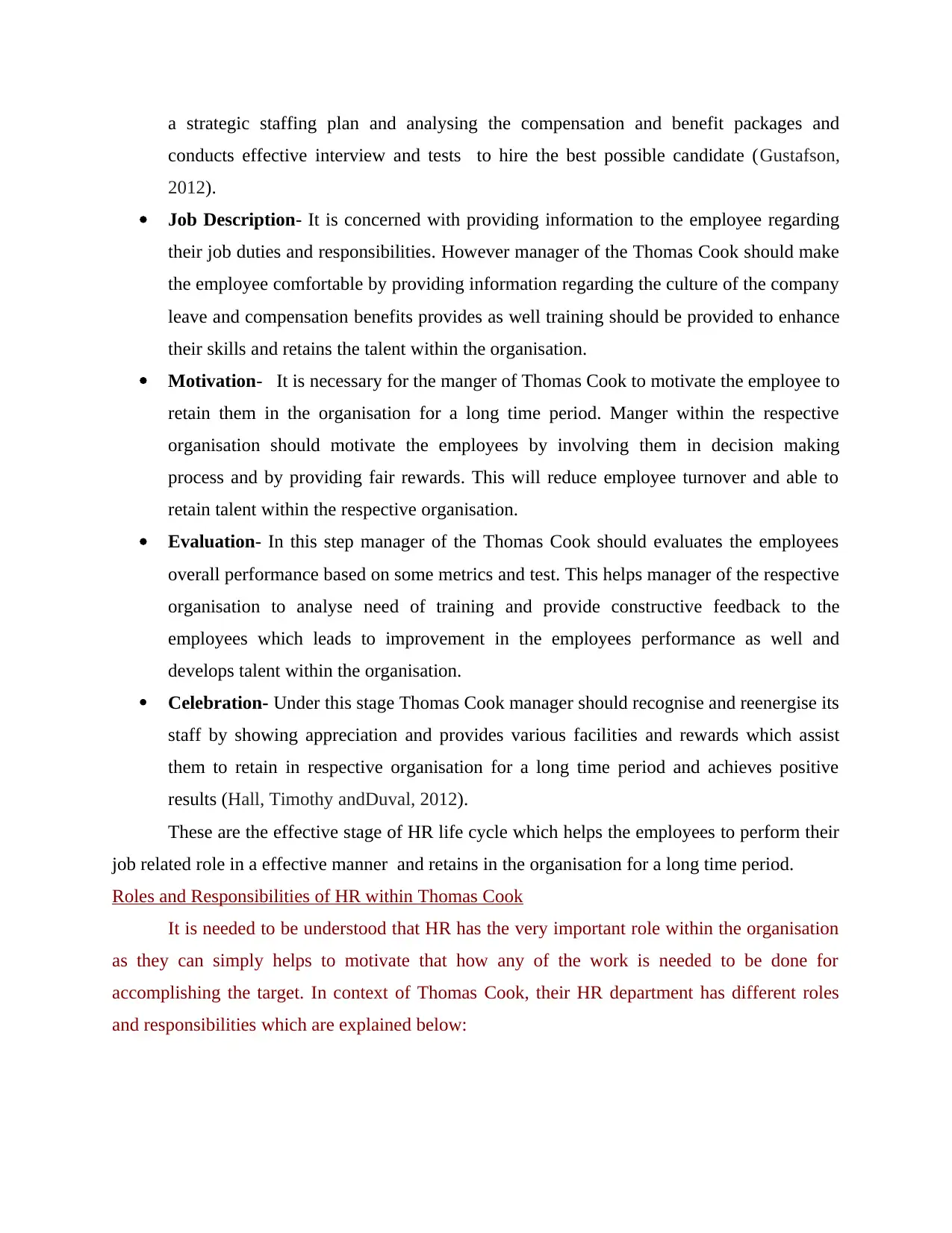
a strategic staffing plan and analysing the compensation and benefit packages and
conducts effective interview and tests to hire the best possible candidate (Gustafson,
2012).
Job Description- It is concerned with providing information to the employee regarding
their job duties and responsibilities. However manager of the Thomas Cook should make
the employee comfortable by providing information regarding the culture of the company
leave and compensation benefits provides as well training should be provided to enhance
their skills and retains the talent within the organisation.
Motivation- It is necessary for the manger of Thomas Cook to motivate the employee to
retain them in the organisation for a long time period. Manger within the respective
organisation should motivate the employees by involving them in decision making
process and by providing fair rewards. This will reduce employee turnover and able to
retain talent within the respective organisation.
Evaluation- In this step manager of the Thomas Cook should evaluates the employees
overall performance based on some metrics and test. This helps manager of the respective
organisation to analyse need of training and provide constructive feedback to the
employees which leads to improvement in the employees performance as well and
develops talent within the organisation.
Celebration- Under this stage Thomas Cook manager should recognise and reenergise its
staff by showing appreciation and provides various facilities and rewards which assist
them to retain in respective organisation for a long time period and achieves positive
results (Hall, Timothy andDuval, 2012).
These are the effective stage of HR life cycle which helps the employees to perform their
job related role in a effective manner and retains in the organisation for a long time period.
Roles and Responsibilities of HR within Thomas Cook
It is needed to be understood that HR has the very important role within the organisation
as they can simply helps to motivate that how any of the work is needed to be done for
accomplishing the target. In context of Thomas Cook, their HR department has different roles
and responsibilities which are explained below:
conducts effective interview and tests to hire the best possible candidate (Gustafson,
2012).
Job Description- It is concerned with providing information to the employee regarding
their job duties and responsibilities. However manager of the Thomas Cook should make
the employee comfortable by providing information regarding the culture of the company
leave and compensation benefits provides as well training should be provided to enhance
their skills and retains the talent within the organisation.
Motivation- It is necessary for the manger of Thomas Cook to motivate the employee to
retain them in the organisation for a long time period. Manger within the respective
organisation should motivate the employees by involving them in decision making
process and by providing fair rewards. This will reduce employee turnover and able to
retain talent within the respective organisation.
Evaluation- In this step manager of the Thomas Cook should evaluates the employees
overall performance based on some metrics and test. This helps manager of the respective
organisation to analyse need of training and provide constructive feedback to the
employees which leads to improvement in the employees performance as well and
develops talent within the organisation.
Celebration- Under this stage Thomas Cook manager should recognise and reenergise its
staff by showing appreciation and provides various facilities and rewards which assist
them to retain in respective organisation for a long time period and achieves positive
results (Hall, Timothy andDuval, 2012).
These are the effective stage of HR life cycle which helps the employees to perform their
job related role in a effective manner and retains in the organisation for a long time period.
Roles and Responsibilities of HR within Thomas Cook
It is needed to be understood that HR has the very important role within the organisation
as they can simply helps to motivate that how any of the work is needed to be done for
accomplishing the target. In context of Thomas Cook, their HR department has different roles
and responsibilities which are explained below:
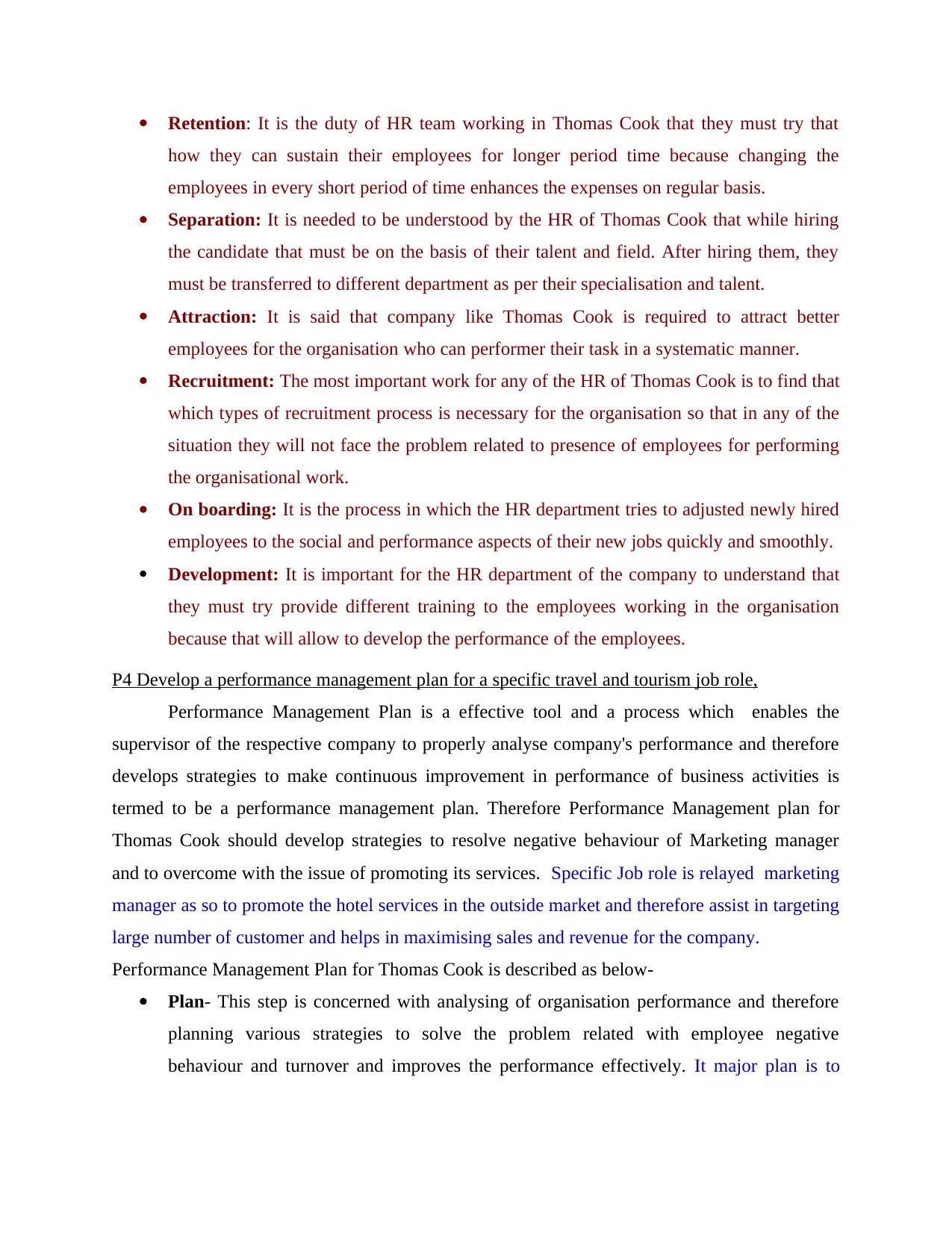
Retention: It is the duty of HR team working in Thomas Cook that they must try that
how they can sustain their employees for longer period time because changing the
employees in every short period of time enhances the expenses on regular basis.
Separation: It is needed to be understood by the HR of Thomas Cook that while hiring
the candidate that must be on the basis of their talent and field. After hiring them, they
must be transferred to different department as per their specialisation and talent.
Attraction: It is said that company like Thomas Cook is required to attract better
employees for the organisation who can performer their task in a systematic manner.
Recruitment: The most important work for any of the HR of Thomas Cook is to find that
which types of recruitment process is necessary for the organisation so that in any of the
situation they will not face the problem related to presence of employees for performing
the organisational work.
On boarding: It is the process in which the HR department tries to adjusted newly hired
employees to the social and performance aspects of their new jobs quickly and smoothly.
Development: It is important for the HR department of the company to understand that
they must try provide different training to the employees working in the organisation
because that will allow to develop the performance of the employees.
P4 Develop a performance management plan for a specific travel and tourism job role,
Performance Management Plan is a effective tool and a process which enables the
supervisor of the respective company to properly analyse company's performance and therefore
develops strategies to make continuous improvement in performance of business activities is
termed to be a performance management plan. Therefore Performance Management plan for
Thomas Cook should develop strategies to resolve negative behaviour of Marketing manager
and to overcome with the issue of promoting its services. Specific Job role is relayed marketing
manager as so to promote the hotel services in the outside market and therefore assist in targeting
large number of customer and helps in maximising sales and revenue for the company.
Performance Management Plan for Thomas Cook is described as below-
Plan- This step is concerned with analysing of organisation performance and therefore
planning various strategies to solve the problem related with employee negative
behaviour and turnover and improves the performance effectively. It major plan is to
how they can sustain their employees for longer period time because changing the
employees in every short period of time enhances the expenses on regular basis.
Separation: It is needed to be understood by the HR of Thomas Cook that while hiring
the candidate that must be on the basis of their talent and field. After hiring them, they
must be transferred to different department as per their specialisation and talent.
Attraction: It is said that company like Thomas Cook is required to attract better
employees for the organisation who can performer their task in a systematic manner.
Recruitment: The most important work for any of the HR of Thomas Cook is to find that
which types of recruitment process is necessary for the organisation so that in any of the
situation they will not face the problem related to presence of employees for performing
the organisational work.
On boarding: It is the process in which the HR department tries to adjusted newly hired
employees to the social and performance aspects of their new jobs quickly and smoothly.
Development: It is important for the HR department of the company to understand that
they must try provide different training to the employees working in the organisation
because that will allow to develop the performance of the employees.
P4 Develop a performance management plan for a specific travel and tourism job role,
Performance Management Plan is a effective tool and a process which enables the
supervisor of the respective company to properly analyse company's performance and therefore
develops strategies to make continuous improvement in performance of business activities is
termed to be a performance management plan. Therefore Performance Management plan for
Thomas Cook should develop strategies to resolve negative behaviour of Marketing manager
and to overcome with the issue of promoting its services. Specific Job role is relayed marketing
manager as so to promote the hotel services in the outside market and therefore assist in targeting
large number of customer and helps in maximising sales and revenue for the company.
Performance Management Plan for Thomas Cook is described as below-
Plan- This step is concerned with analysing of organisation performance and therefore
planning various strategies to solve the problem related with employee negative
behaviour and turnover and improves the performance effectively. It major plan is to
Paraphrase This Document
Need a fresh take? Get an instant paraphrase of this document with our AI Paraphraser
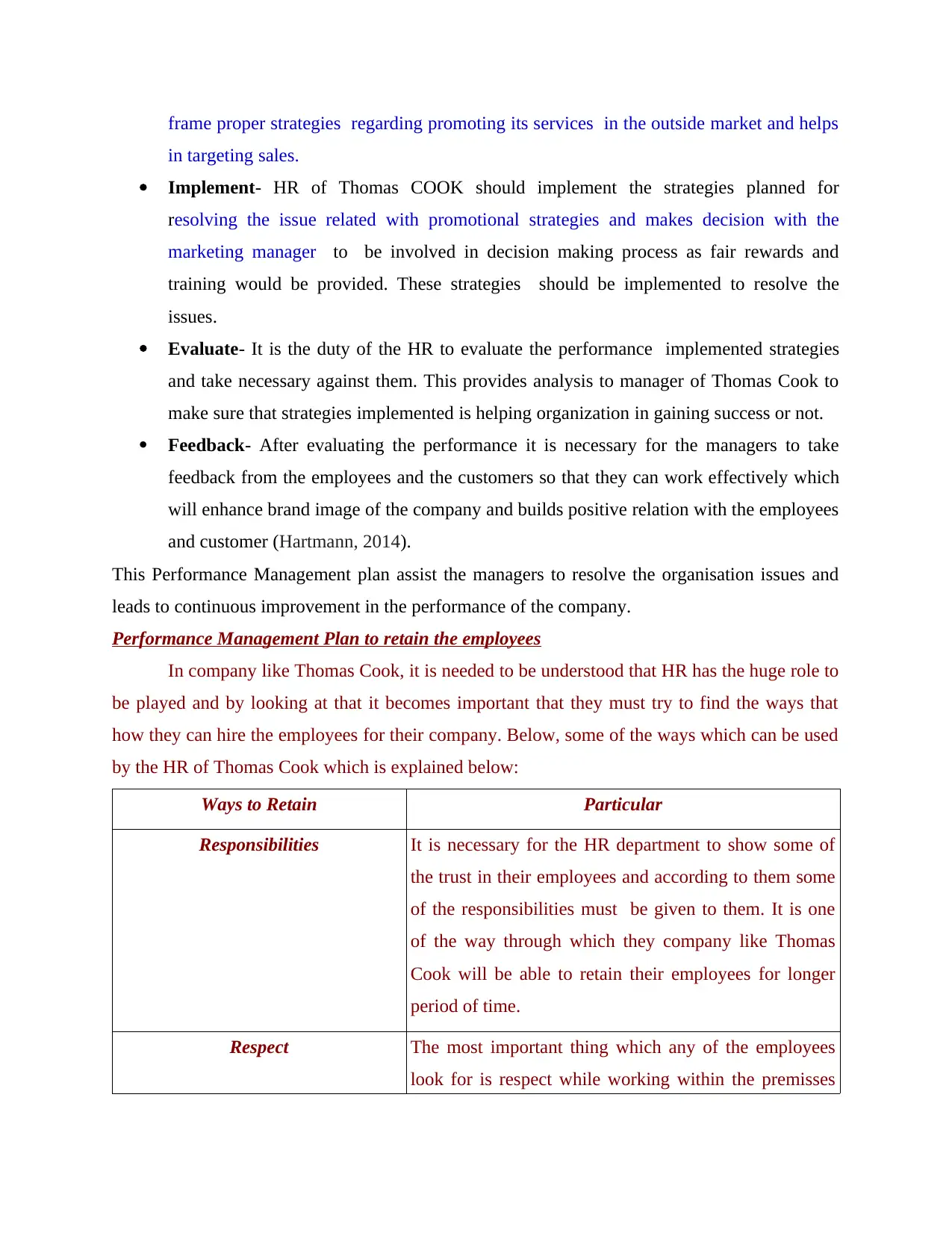
frame proper strategies regarding promoting its services in the outside market and helps
in targeting sales.
Implement- HR of Thomas COOK should implement the strategies planned for
resolving the issue related with promotional strategies and makes decision with the
marketing manager to be involved in decision making process as fair rewards and
training would be provided. These strategies should be implemented to resolve the
issues.
Evaluate- It is the duty of the HR to evaluate the performance implemented strategies
and take necessary against them. This provides analysis to manager of Thomas Cook to
make sure that strategies implemented is helping organization in gaining success or not.
Feedback- After evaluating the performance it is necessary for the managers to take
feedback from the employees and the customers so that they can work effectively which
will enhance brand image of the company and builds positive relation with the employees
and customer (Hartmann, 2014).
This Performance Management plan assist the managers to resolve the organisation issues and
leads to continuous improvement in the performance of the company.
Performance Management Plan to retain the employees
In company like Thomas Cook, it is needed to be understood that HR has the huge role to
be played and by looking at that it becomes important that they must try to find the ways that
how they can hire the employees for their company. Below, some of the ways which can be used
by the HR of Thomas Cook which is explained below:
Ways to Retain Particular
Responsibilities It is necessary for the HR department to show some of
the trust in their employees and according to them some
of the responsibilities must be given to them. It is one
of the way through which they company like Thomas
Cook will be able to retain their employees for longer
period of time.
Respect The most important thing which any of the employees
look for is respect while working within the premisses
in targeting sales.
Implement- HR of Thomas COOK should implement the strategies planned for
resolving the issue related with promotional strategies and makes decision with the
marketing manager to be involved in decision making process as fair rewards and
training would be provided. These strategies should be implemented to resolve the
issues.
Evaluate- It is the duty of the HR to evaluate the performance implemented strategies
and take necessary against them. This provides analysis to manager of Thomas Cook to
make sure that strategies implemented is helping organization in gaining success or not.
Feedback- After evaluating the performance it is necessary for the managers to take
feedback from the employees and the customers so that they can work effectively which
will enhance brand image of the company and builds positive relation with the employees
and customer (Hartmann, 2014).
This Performance Management plan assist the managers to resolve the organisation issues and
leads to continuous improvement in the performance of the company.
Performance Management Plan to retain the employees
In company like Thomas Cook, it is needed to be understood that HR has the huge role to
be played and by looking at that it becomes important that they must try to find the ways that
how they can hire the employees for their company. Below, some of the ways which can be used
by the HR of Thomas Cook which is explained below:
Ways to Retain Particular
Responsibilities It is necessary for the HR department to show some of
the trust in their employees and according to them some
of the responsibilities must be given to them. It is one
of the way through which they company like Thomas
Cook will be able to retain their employees for longer
period of time.
Respect The most important thing which any of the employees
look for is respect while working within the premisses
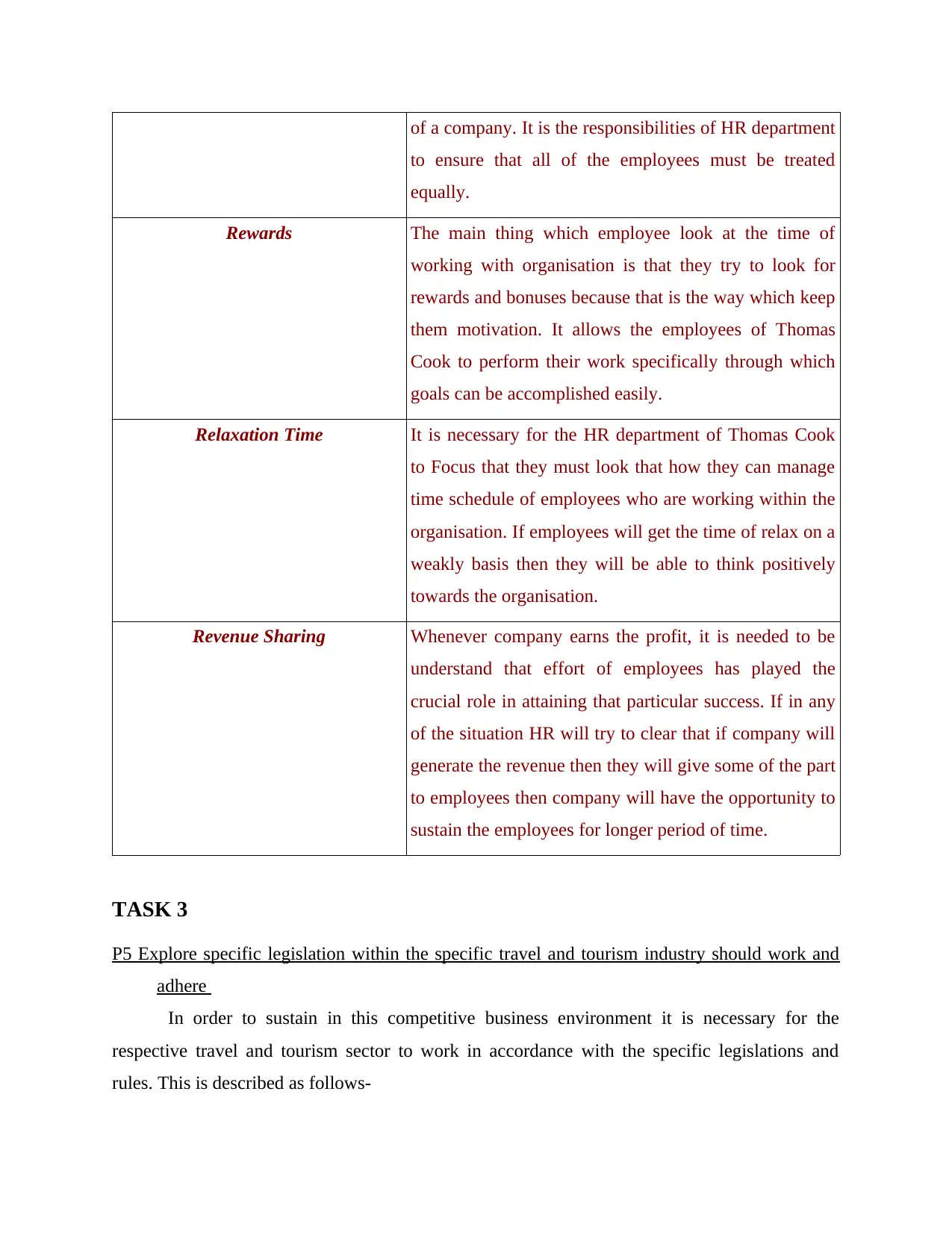
of a company. It is the responsibilities of HR department
to ensure that all of the employees must be treated
equally.
Rewards The main thing which employee look at the time of
working with organisation is that they try to look for
rewards and bonuses because that is the way which keep
them motivation. It allows the employees of Thomas
Cook to perform their work specifically through which
goals can be accomplished easily.
Relaxation Time It is necessary for the HR department of Thomas Cook
to Focus that they must look that how they can manage
time schedule of employees who are working within the
organisation. If employees will get the time of relax on a
weakly basis then they will be able to think positively
towards the organisation.
Revenue Sharing Whenever company earns the profit, it is needed to be
understand that effort of employees has played the
crucial role in attaining that particular success. If in any
of the situation HR will try to clear that if company will
generate the revenue then they will give some of the part
to employees then company will have the opportunity to
sustain the employees for longer period of time.
TASK 3
P5 Explore specific legislation within the specific travel and tourism industry should work and
adhere
In order to sustain in this competitive business environment it is necessary for the
respective travel and tourism sector to work in accordance with the specific legislations and
rules. This is described as follows-
to ensure that all of the employees must be treated
equally.
Rewards The main thing which employee look at the time of
working with organisation is that they try to look for
rewards and bonuses because that is the way which keep
them motivation. It allows the employees of Thomas
Cook to perform their work specifically through which
goals can be accomplished easily.
Relaxation Time It is necessary for the HR department of Thomas Cook
to Focus that they must look that how they can manage
time schedule of employees who are working within the
organisation. If employees will get the time of relax on a
weakly basis then they will be able to think positively
towards the organisation.
Revenue Sharing Whenever company earns the profit, it is needed to be
understand that effort of employees has played the
crucial role in attaining that particular success. If in any
of the situation HR will try to clear that if company will
generate the revenue then they will give some of the part
to employees then company will have the opportunity to
sustain the employees for longer period of time.
TASK 3
P5 Explore specific legislation within the specific travel and tourism industry should work and
adhere
In order to sustain in this competitive business environment it is necessary for the
respective travel and tourism sector to work in accordance with the specific legislations and
rules. This is described as follows-
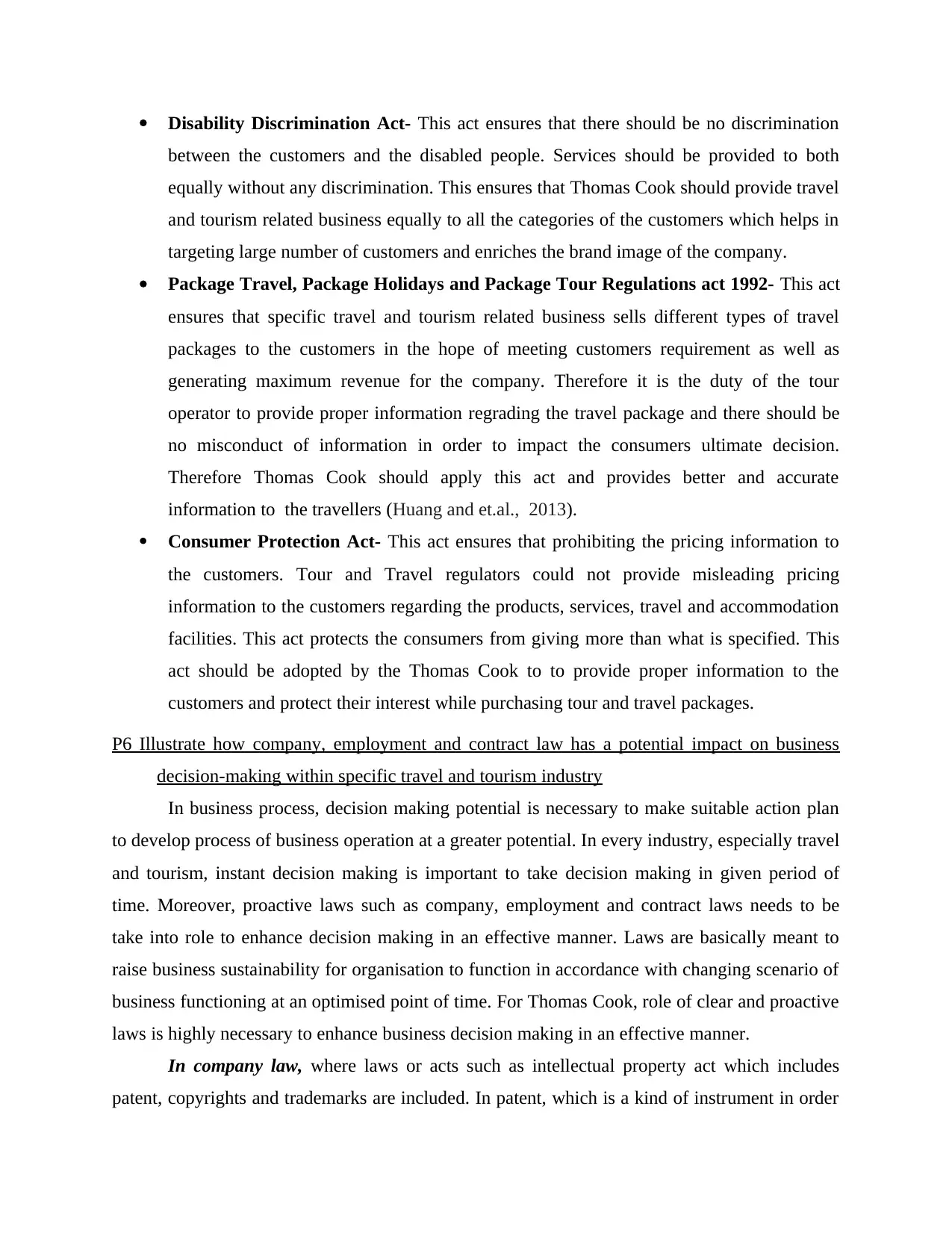
Disability Discrimination Act- This act ensures that there should be no discrimination
between the customers and the disabled people. Services should be provided to both
equally without any discrimination. This ensures that Thomas Cook should provide travel
and tourism related business equally to all the categories of the customers which helps in
targeting large number of customers and enriches the brand image of the company.
Package Travel, Package Holidays and Package Tour Regulations act 1992- This act
ensures that specific travel and tourism related business sells different types of travel
packages to the customers in the hope of meeting customers requirement as well as
generating maximum revenue for the company. Therefore it is the duty of the tour
operator to provide proper information regrading the travel package and there should be
no misconduct of information in order to impact the consumers ultimate decision.
Therefore Thomas Cook should apply this act and provides better and accurate
information to the travellers (Huang and et.al., 2013).
Consumer Protection Act- This act ensures that prohibiting the pricing information to
the customers. Tour and Travel regulators could not provide misleading pricing
information to the customers regarding the products, services, travel and accommodation
facilities. This act protects the consumers from giving more than what is specified. This
act should be adopted by the Thomas Cook to to provide proper information to the
customers and protect their interest while purchasing tour and travel packages.
P6 Illustrate how company, employment and contract law has a potential impact on business
decision-making within specific travel and tourism industry
In business process, decision making potential is necessary to make suitable action plan
to develop process of business operation at a greater potential. In every industry, especially travel
and tourism, instant decision making is important to take decision making in given period of
time. Moreover, proactive laws such as company, employment and contract laws needs to be
take into role to enhance decision making in an effective manner. Laws are basically meant to
raise business sustainability for organisation to function in accordance with changing scenario of
business functioning at an optimised point of time. For Thomas Cook, role of clear and proactive
laws is highly necessary to enhance business decision making in an effective manner.
In company law, where laws or acts such as intellectual property act which includes
patent, copyrights and trademarks are included. In patent, which is a kind of instrument in order
between the customers and the disabled people. Services should be provided to both
equally without any discrimination. This ensures that Thomas Cook should provide travel
and tourism related business equally to all the categories of the customers which helps in
targeting large number of customers and enriches the brand image of the company.
Package Travel, Package Holidays and Package Tour Regulations act 1992- This act
ensures that specific travel and tourism related business sells different types of travel
packages to the customers in the hope of meeting customers requirement as well as
generating maximum revenue for the company. Therefore it is the duty of the tour
operator to provide proper information regrading the travel package and there should be
no misconduct of information in order to impact the consumers ultimate decision.
Therefore Thomas Cook should apply this act and provides better and accurate
information to the travellers (Huang and et.al., 2013).
Consumer Protection Act- This act ensures that prohibiting the pricing information to
the customers. Tour and Travel regulators could not provide misleading pricing
information to the customers regarding the products, services, travel and accommodation
facilities. This act protects the consumers from giving more than what is specified. This
act should be adopted by the Thomas Cook to to provide proper information to the
customers and protect their interest while purchasing tour and travel packages.
P6 Illustrate how company, employment and contract law has a potential impact on business
decision-making within specific travel and tourism industry
In business process, decision making potential is necessary to make suitable action plan
to develop process of business operation at a greater potential. In every industry, especially travel
and tourism, instant decision making is important to take decision making in given period of
time. Moreover, proactive laws such as company, employment and contract laws needs to be
take into role to enhance decision making in an effective manner. Laws are basically meant to
raise business sustainability for organisation to function in accordance with changing scenario of
business functioning at an optimised point of time. For Thomas Cook, role of clear and proactive
laws is highly necessary to enhance business decision making in an effective manner.
In company law, where laws or acts such as intellectual property act which includes
patent, copyrights and trademarks are included. In patent, which is a kind of instrument in order
Secure Best Marks with AI Grader
Need help grading? Try our AI Grader for instant feedback on your assignments.
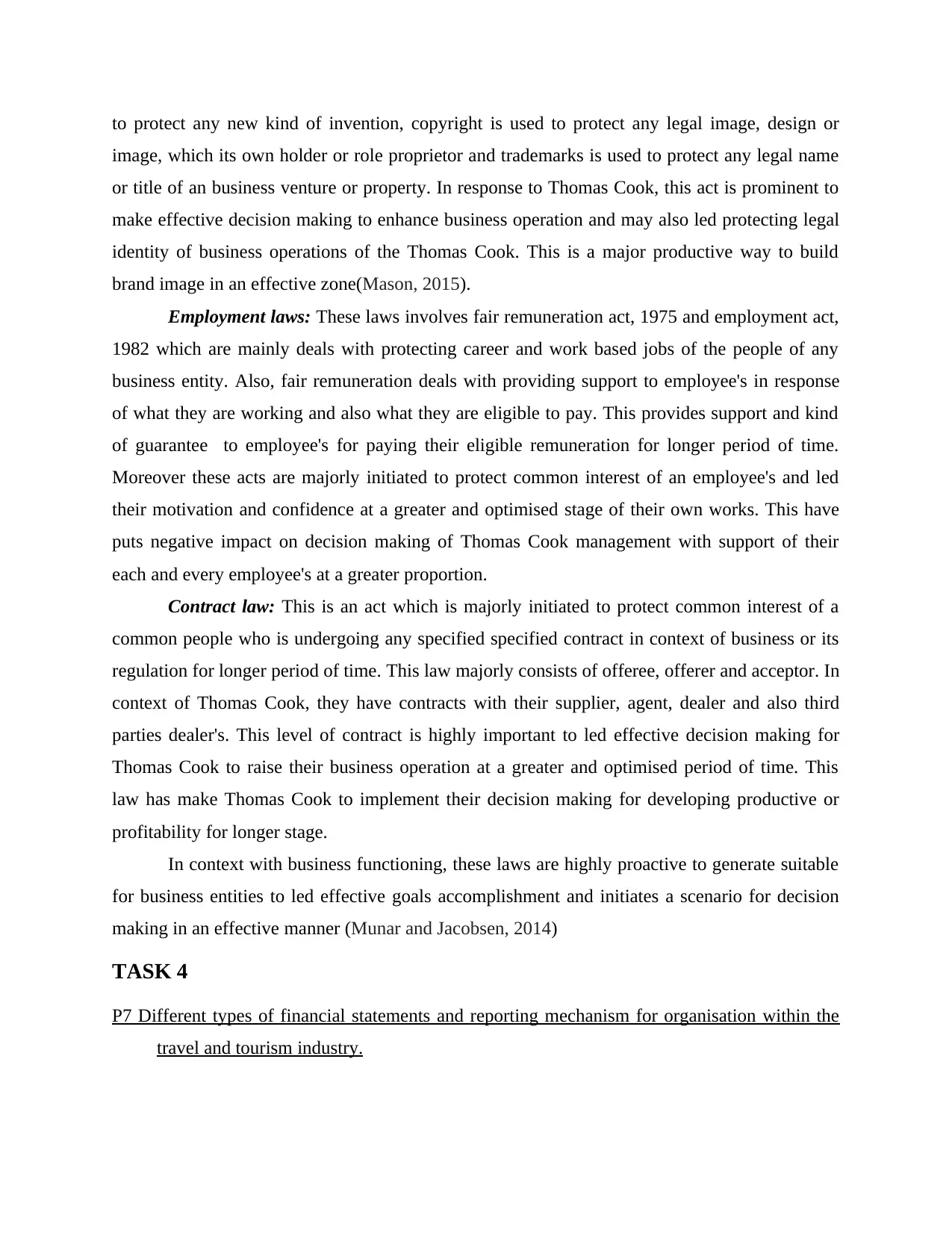
to protect any new kind of invention, copyright is used to protect any legal image, design or
image, which its own holder or role proprietor and trademarks is used to protect any legal name
or title of an business venture or property. In response to Thomas Cook, this act is prominent to
make effective decision making to enhance business operation and may also led protecting legal
identity of business operations of the Thomas Cook. This is a major productive way to build
brand image in an effective zone(Mason, 2015).
Employment laws: These laws involves fair remuneration act, 1975 and employment act,
1982 which are mainly deals with protecting career and work based jobs of the people of any
business entity. Also, fair remuneration deals with providing support to employee's in response
of what they are working and also what they are eligible to pay. This provides support and kind
of guarantee to employee's for paying their eligible remuneration for longer period of time.
Moreover these acts are majorly initiated to protect common interest of an employee's and led
their motivation and confidence at a greater and optimised stage of their own works. This have
puts negative impact on decision making of Thomas Cook management with support of their
each and every employee's at a greater proportion.
Contract law: This is an act which is majorly initiated to protect common interest of a
common people who is undergoing any specified specified contract in context of business or its
regulation for longer period of time. This law majorly consists of offeree, offerer and acceptor. In
context of Thomas Cook, they have contracts with their supplier, agent, dealer and also third
parties dealer's. This level of contract is highly important to led effective decision making for
Thomas Cook to raise their business operation at a greater and optimised period of time. This
law has make Thomas Cook to implement their decision making for developing productive or
profitability for longer stage.
In context with business functioning, these laws are highly proactive to generate suitable
for business entities to led effective goals accomplishment and initiates a scenario for decision
making in an effective manner (Munar and Jacobsen, 2014)
TASK 4
P7 Different types of financial statements and reporting mechanism for organisation within the
travel and tourism industry.
image, which its own holder or role proprietor and trademarks is used to protect any legal name
or title of an business venture or property. In response to Thomas Cook, this act is prominent to
make effective decision making to enhance business operation and may also led protecting legal
identity of business operations of the Thomas Cook. This is a major productive way to build
brand image in an effective zone(Mason, 2015).
Employment laws: These laws involves fair remuneration act, 1975 and employment act,
1982 which are mainly deals with protecting career and work based jobs of the people of any
business entity. Also, fair remuneration deals with providing support to employee's in response
of what they are working and also what they are eligible to pay. This provides support and kind
of guarantee to employee's for paying their eligible remuneration for longer period of time.
Moreover these acts are majorly initiated to protect common interest of an employee's and led
their motivation and confidence at a greater and optimised stage of their own works. This have
puts negative impact on decision making of Thomas Cook management with support of their
each and every employee's at a greater proportion.
Contract law: This is an act which is majorly initiated to protect common interest of a
common people who is undergoing any specified specified contract in context of business or its
regulation for longer period of time. This law majorly consists of offeree, offerer and acceptor. In
context of Thomas Cook, they have contracts with their supplier, agent, dealer and also third
parties dealer's. This level of contract is highly important to led effective decision making for
Thomas Cook to raise their business operation at a greater and optimised period of time. This
law has make Thomas Cook to implement their decision making for developing productive or
profitability for longer stage.
In context with business functioning, these laws are highly proactive to generate suitable
for business entities to led effective goals accomplishment and initiates a scenario for decision
making in an effective manner (Munar and Jacobsen, 2014)
TASK 4
P7 Different types of financial statements and reporting mechanism for organisation within the
travel and tourism industry.
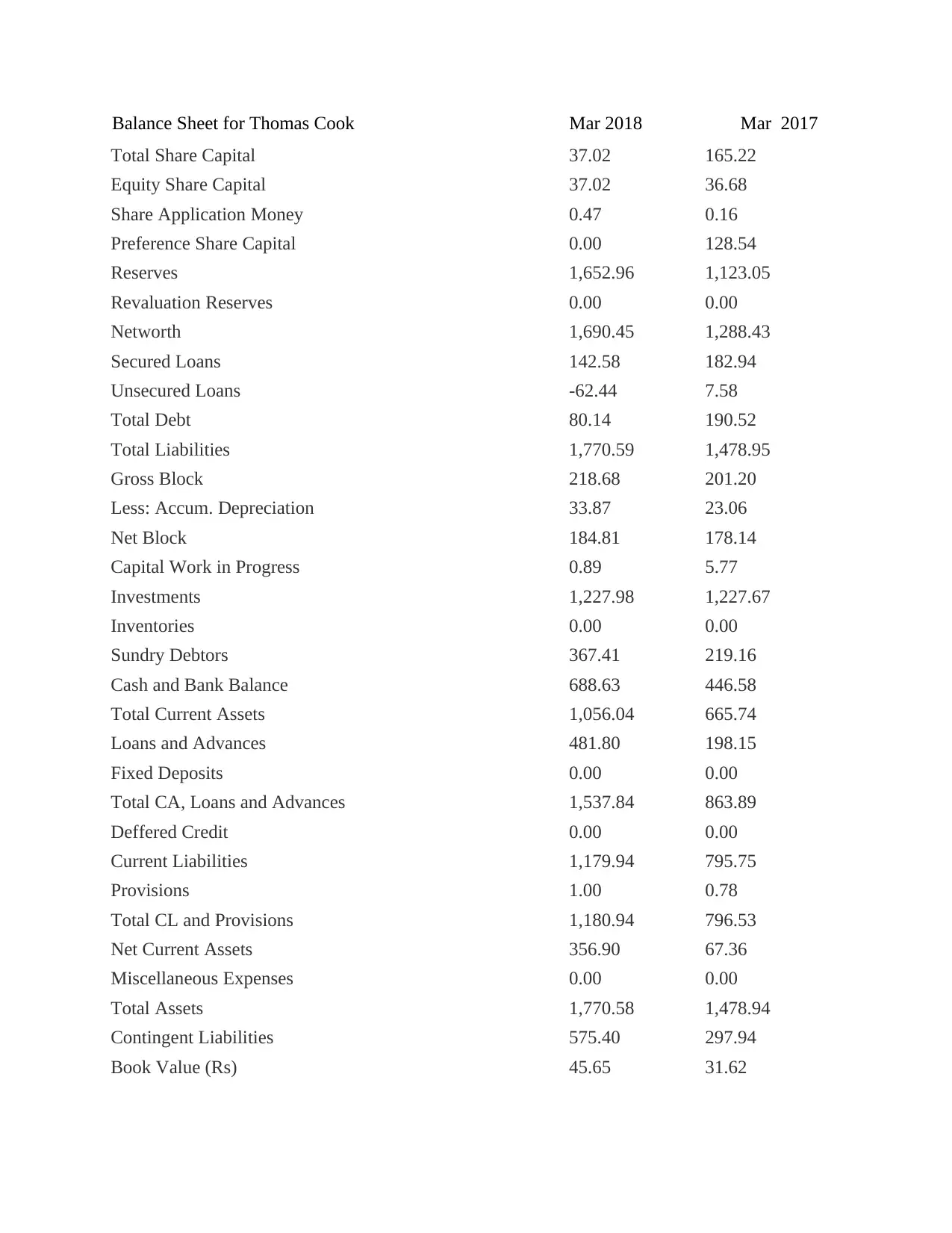
Balance Sheet for Thomas Cook Mar 2018 Mar 2017
Total Share Capital 37.02 165.22
Equity Share Capital 37.02 36.68
Share Application Money 0.47 0.16
Preference Share Capital 0.00 128.54
Reserves 1,652.96 1,123.05
Revaluation Reserves 0.00 0.00
Networth 1,690.45 1,288.43
Secured Loans 142.58 182.94
Unsecured Loans -62.44 7.58
Total Debt 80.14 190.52
Total Liabilities 1,770.59 1,478.95
Gross Block 218.68 201.20
Less: Accum. Depreciation 33.87 23.06
Net Block 184.81 178.14
Capital Work in Progress 0.89 5.77
Investments 1,227.98 1,227.67
Inventories 0.00 0.00
Sundry Debtors 367.41 219.16
Cash and Bank Balance 688.63 446.58
Total Current Assets 1,056.04 665.74
Loans and Advances 481.80 198.15
Fixed Deposits 0.00 0.00
Total CA, Loans and Advances 1,537.84 863.89
Deffered Credit 0.00 0.00
Current Liabilities 1,179.94 795.75
Provisions 1.00 0.78
Total CL and Provisions 1,180.94 796.53
Net Current Assets 356.90 67.36
Miscellaneous Expenses 0.00 0.00
Total Assets 1,770.58 1,478.94
Contingent Liabilities 575.40 297.94
Book Value (Rs) 45.65 31.62
Total Share Capital 37.02 165.22
Equity Share Capital 37.02 36.68
Share Application Money 0.47 0.16
Preference Share Capital 0.00 128.54
Reserves 1,652.96 1,123.05
Revaluation Reserves 0.00 0.00
Networth 1,690.45 1,288.43
Secured Loans 142.58 182.94
Unsecured Loans -62.44 7.58
Total Debt 80.14 190.52
Total Liabilities 1,770.59 1,478.95
Gross Block 218.68 201.20
Less: Accum. Depreciation 33.87 23.06
Net Block 184.81 178.14
Capital Work in Progress 0.89 5.77
Investments 1,227.98 1,227.67
Inventories 0.00 0.00
Sundry Debtors 367.41 219.16
Cash and Bank Balance 688.63 446.58
Total Current Assets 1,056.04 665.74
Loans and Advances 481.80 198.15
Fixed Deposits 0.00 0.00
Total CA, Loans and Advances 1,537.84 863.89
Deffered Credit 0.00 0.00
Current Liabilities 1,179.94 795.75
Provisions 1.00 0.78
Total CL and Provisions 1,180.94 796.53
Net Current Assets 356.90 67.36
Miscellaneous Expenses 0.00 0.00
Total Assets 1,770.58 1,478.94
Contingent Liabilities 575.40 297.94
Book Value (Rs) 45.65 31.62
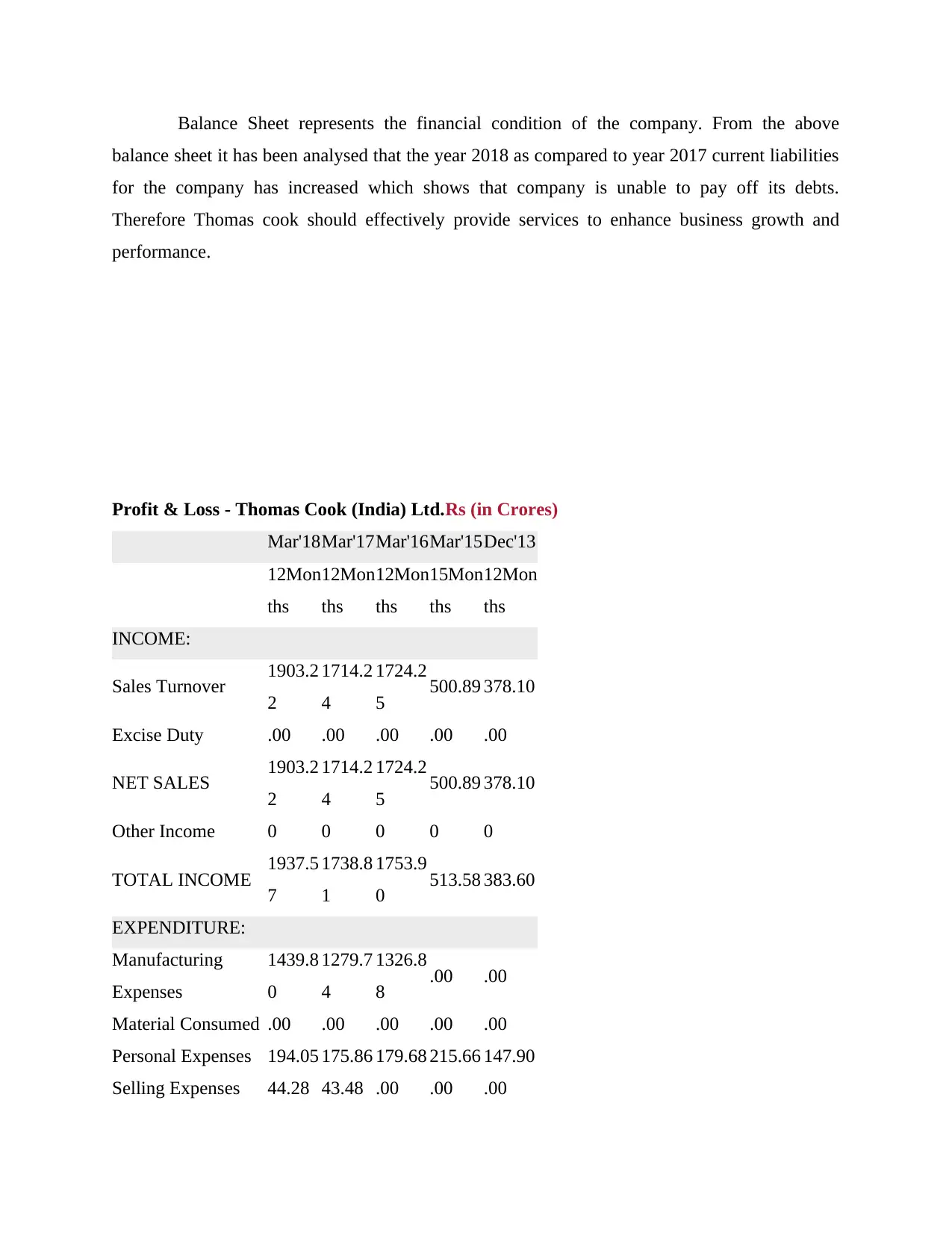
Balance Sheet represents the financial condition of the company. From the above
balance sheet it has been analysed that the year 2018 as compared to year 2017 current liabilities
for the company has increased which shows that company is unable to pay off its debts.
Therefore Thomas cook should effectively provide services to enhance business growth and
performance.
Profit & Loss - Thomas Cook (India) Ltd.Rs (in Crores)
Mar'18Mar'17Mar'16Mar'15Dec'13
12Mon
ths
12Mon
ths
12Mon
ths
15Mon
ths
12Mon
ths
INCOME:
Sales Turnover 1903.2
2
1714.2
4
1724.2
5 500.89 378.10
Excise Duty .00 .00 .00 .00 .00
NET SALES 1903.2
2
1714.2
4
1724.2
5 500.89 378.10
Other Income 0 0 0 0 0
TOTAL INCOME 1937.5
7
1738.8
1
1753.9
0 513.58 383.60
EXPENDITURE:
Manufacturing
Expenses
1439.8
0
1279.7
4
1326.8
8 .00 .00
Material Consumed .00 .00 .00 .00 .00
Personal Expenses 194.05 175.86 179.68 215.66 147.90
Selling Expenses 44.28 43.48 .00 .00 .00
balance sheet it has been analysed that the year 2018 as compared to year 2017 current liabilities
for the company has increased which shows that company is unable to pay off its debts.
Therefore Thomas cook should effectively provide services to enhance business growth and
performance.
Profit & Loss - Thomas Cook (India) Ltd.Rs (in Crores)
Mar'18Mar'17Mar'16Mar'15Dec'13
12Mon
ths
12Mon
ths
12Mon
ths
15Mon
ths
12Mon
ths
INCOME:
Sales Turnover 1903.2
2
1714.2
4
1724.2
5 500.89 378.10
Excise Duty .00 .00 .00 .00 .00
NET SALES 1903.2
2
1714.2
4
1724.2
5 500.89 378.10
Other Income 0 0 0 0 0
TOTAL INCOME 1937.5
7
1738.8
1
1753.9
0 513.58 383.60
EXPENDITURE:
Manufacturing
Expenses
1439.8
0
1279.7
4
1326.8
8 .00 .00
Material Consumed .00 .00 .00 .00 .00
Personal Expenses 194.05 175.86 179.68 215.66 147.90
Selling Expenses 44.28 43.48 .00 .00 .00
Paraphrase This Document
Need a fresh take? Get an instant paraphrase of this document with our AI Paraphraser
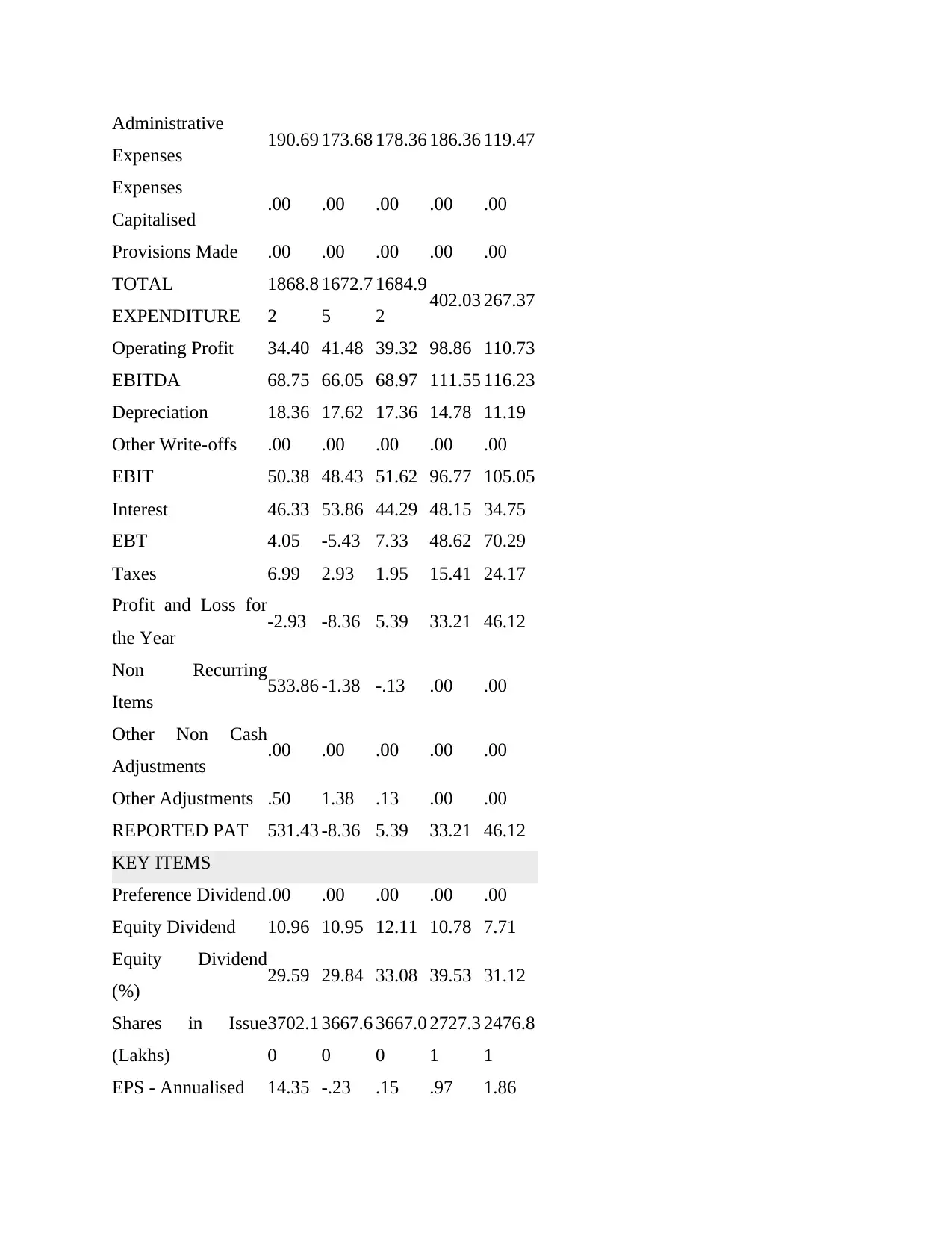
Administrative
Expenses 190.69 173.68 178.36 186.36 119.47
Expenses
Capitalised .00 .00 .00 .00 .00
Provisions Made .00 .00 .00 .00 .00
TOTAL
EXPENDITURE
1868.8
2
1672.7
5
1684.9
2 402.03 267.37
Operating Profit 34.40 41.48 39.32 98.86 110.73
EBITDA 68.75 66.05 68.97 111.55 116.23
Depreciation 18.36 17.62 17.36 14.78 11.19
Other Write-offs .00 .00 .00 .00 .00
EBIT 50.38 48.43 51.62 96.77 105.05
Interest 46.33 53.86 44.29 48.15 34.75
EBT 4.05 -5.43 7.33 48.62 70.29
Taxes 6.99 2.93 1.95 15.41 24.17
Profit and Loss for
the Year -2.93 -8.36 5.39 33.21 46.12
Non Recurring
Items 533.86 -1.38 -.13 .00 .00
Other Non Cash
Adjustments .00 .00 .00 .00 .00
Other Adjustments .50 1.38 .13 .00 .00
REPORTED PAT 531.43 -8.36 5.39 33.21 46.12
KEY ITEMS
Preference Dividend.00 .00 .00 .00 .00
Equity Dividend 10.96 10.95 12.11 10.78 7.71
Equity Dividend
(%) 29.59 29.84 33.08 39.53 31.12
Shares in Issue
(Lakhs)
3702.1
0
3667.6
0
3667.0
0
2727.3
1
2476.8
1
EPS - Annualised 14.35 -.23 .15 .97 1.86
Expenses 190.69 173.68 178.36 186.36 119.47
Expenses
Capitalised .00 .00 .00 .00 .00
Provisions Made .00 .00 .00 .00 .00
TOTAL
EXPENDITURE
1868.8
2
1672.7
5
1684.9
2 402.03 267.37
Operating Profit 34.40 41.48 39.32 98.86 110.73
EBITDA 68.75 66.05 68.97 111.55 116.23
Depreciation 18.36 17.62 17.36 14.78 11.19
Other Write-offs .00 .00 .00 .00 .00
EBIT 50.38 48.43 51.62 96.77 105.05
Interest 46.33 53.86 44.29 48.15 34.75
EBT 4.05 -5.43 7.33 48.62 70.29
Taxes 6.99 2.93 1.95 15.41 24.17
Profit and Loss for
the Year -2.93 -8.36 5.39 33.21 46.12
Non Recurring
Items 533.86 -1.38 -.13 .00 .00
Other Non Cash
Adjustments .00 .00 .00 .00 .00
Other Adjustments .50 1.38 .13 .00 .00
REPORTED PAT 531.43 -8.36 5.39 33.21 46.12
KEY ITEMS
Preference Dividend.00 .00 .00 .00 .00
Equity Dividend 10.96 10.95 12.11 10.78 7.71
Equity Dividend
(%) 29.59 29.84 33.08 39.53 31.12
Shares in Issue
(Lakhs)
3702.1
0
3667.6
0
3667.0
0
2727.3
1
2476.8
1
EPS - Annualised 14.35 -.23 .15 .97 1.86
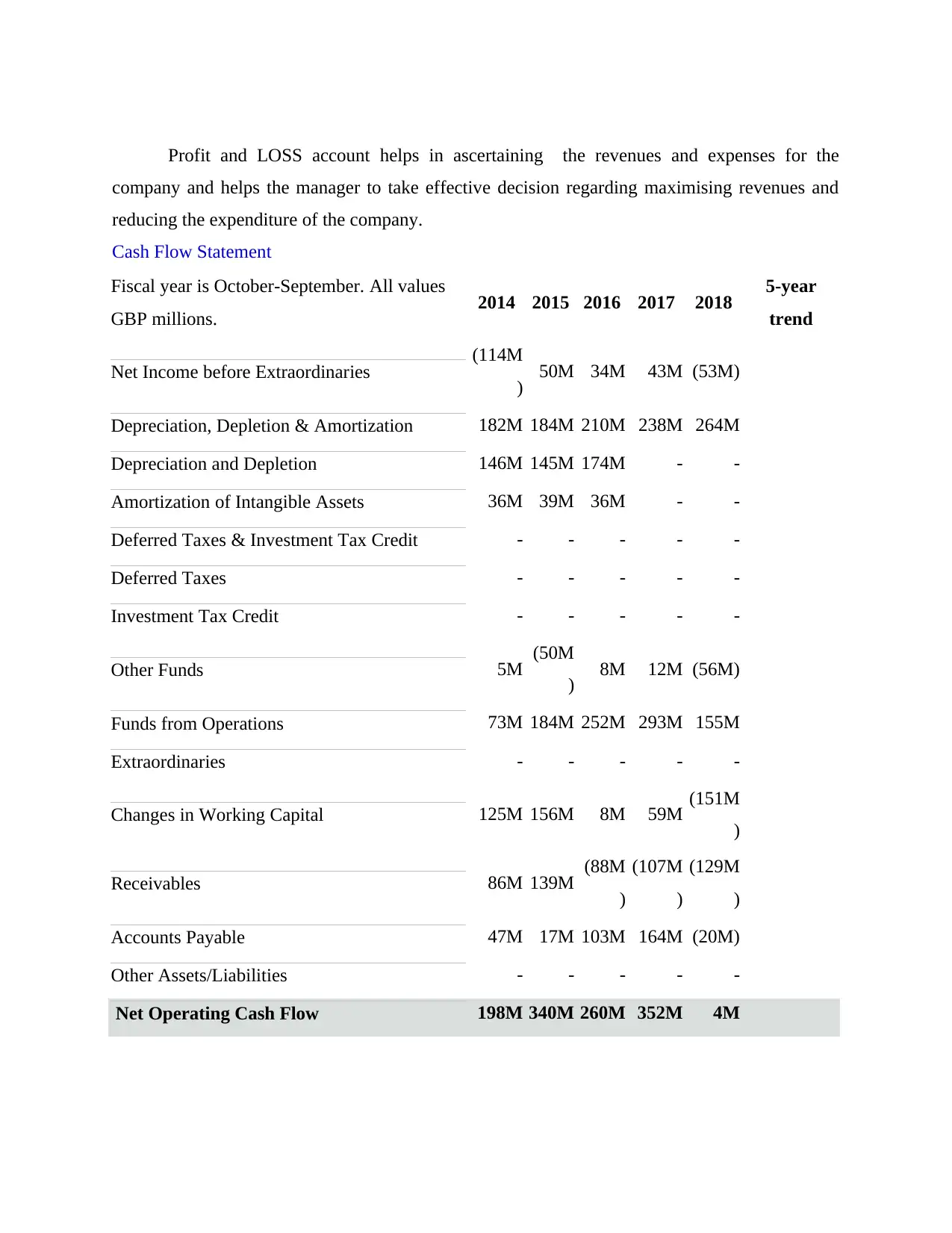
Profit and LOSS account helps in ascertaining the revenues and expenses for the
company and helps the manager to take effective decision regarding maximising revenues and
reducing the expenditure of the company.
Cash Flow Statement
Fiscal year is October-September. All values
GBP millions. 2014 2015 2016 2017 2018 5-year
trend
Net Income before Extraordinaries (114M
) 50M 34M 43M (53M)
Depreciation, Depletion & Amortization 182M 184M 210M 238M 264M
Depreciation and Depletion 146M 145M 174M - -
Amortization of Intangible Assets 36M 39M 36M - -
Deferred Taxes & Investment Tax Credit - - - - -
Deferred Taxes - - - - -
Investment Tax Credit - - - - -
Other Funds 5M (50M
) 8M 12M (56M)
Funds from Operations 73M 184M 252M 293M 155M
Extraordinaries - - - - -
Changes in Working Capital 125M 156M 8M 59M (151M
)
Receivables 86M 139M (88M
)
(107M
)
(129M
)
Accounts Payable 47M 17M 103M 164M (20M)
Other Assets/Liabilities - - - - -
Net Operating Cash Flow 198M 340M 260M 352M 4M
company and helps the manager to take effective decision regarding maximising revenues and
reducing the expenditure of the company.
Cash Flow Statement
Fiscal year is October-September. All values
GBP millions. 2014 2015 2016 2017 2018 5-year
trend
Net Income before Extraordinaries (114M
) 50M 34M 43M (53M)
Depreciation, Depletion & Amortization 182M 184M 210M 238M 264M
Depreciation and Depletion 146M 145M 174M - -
Amortization of Intangible Assets 36M 39M 36M - -
Deferred Taxes & Investment Tax Credit - - - - -
Deferred Taxes - - - - -
Investment Tax Credit - - - - -
Other Funds 5M (50M
) 8M 12M (56M)
Funds from Operations 73M 184M 252M 293M 155M
Extraordinaries - - - - -
Changes in Working Capital 125M 156M 8M 59M (151M
)
Receivables 86M 139M (88M
)
(107M
)
(129M
)
Accounts Payable 47M 17M 103M 164M (20M)
Other Assets/Liabilities - - - - -
Net Operating Cash Flow 198M 340M 260M 352M 4M
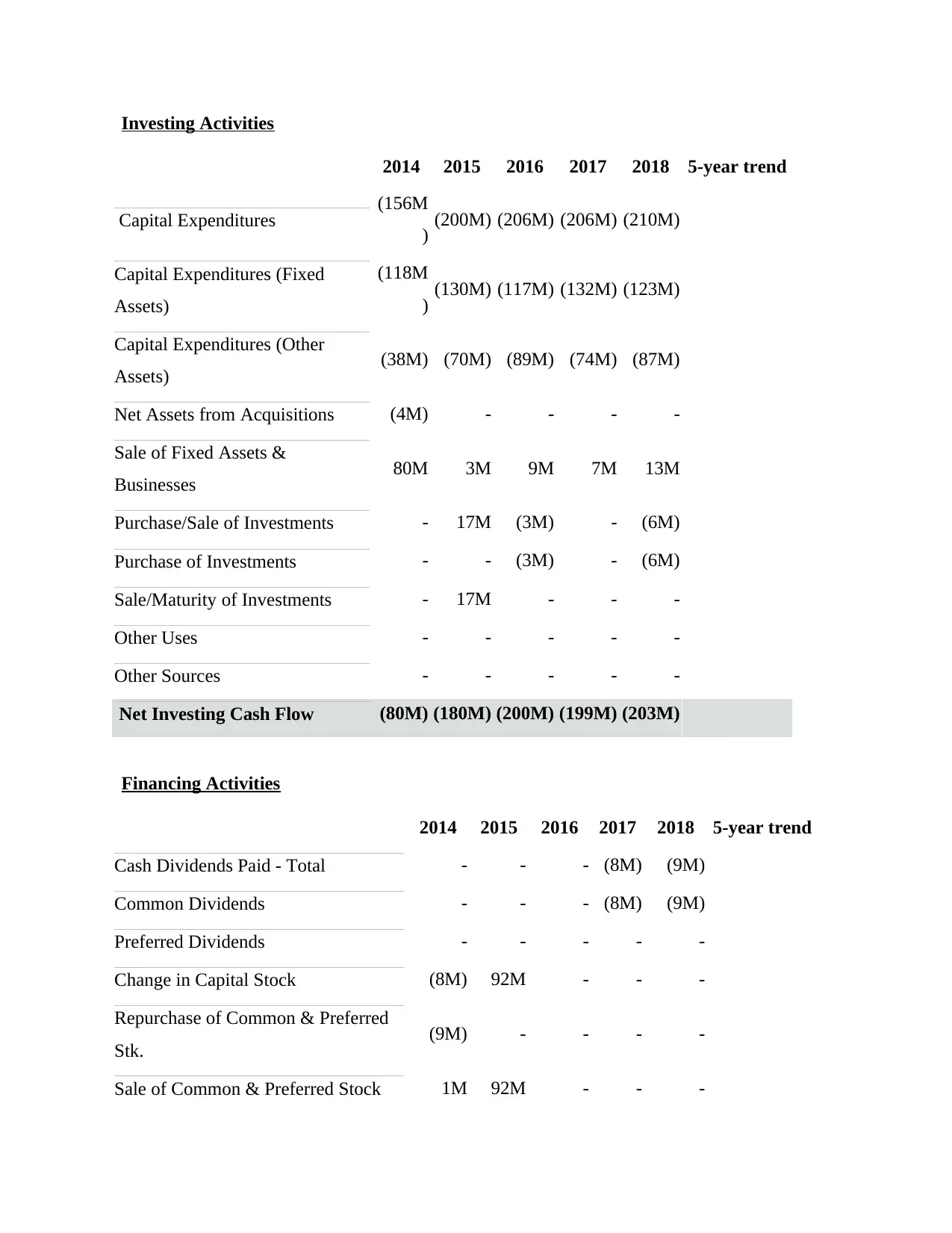
Investing Activities
2014 2015 2016 2017 2018 5-year trend
Capital Expenditures (156M
) (200M) (206M) (206M) (210M)
Capital Expenditures (Fixed
Assets)
(118M
) (130M) (117M) (132M) (123M)
Capital Expenditures (Other
Assets) (38M) (70M) (89M) (74M) (87M)
Net Assets from Acquisitions (4M) - - - -
Sale of Fixed Assets &
Businesses 80M 3M 9M 7M 13M
Purchase/Sale of Investments - 17M (3M) - (6M)
Purchase of Investments - - (3M) - (6M)
Sale/Maturity of Investments - 17M - - -
Other Uses - - - - -
Other Sources - - - - -
Net Investing Cash Flow (80M) (180M) (200M) (199M) (203M)
Financing Activities
2014 2015 2016 2017 2018 5-year trend
Cash Dividends Paid - Total - - - (8M) (9M)
Common Dividends - - - (8M) (9M)
Preferred Dividends - - - - -
Change in Capital Stock (8M) 92M - - -
Repurchase of Common & Preferred
Stk. (9M) - - - -
Sale of Common & Preferred Stock 1M 92M - - -
2014 2015 2016 2017 2018 5-year trend
Capital Expenditures (156M
) (200M) (206M) (206M) (210M)
Capital Expenditures (Fixed
Assets)
(118M
) (130M) (117M) (132M) (123M)
Capital Expenditures (Other
Assets) (38M) (70M) (89M) (74M) (87M)
Net Assets from Acquisitions (4M) - - - -
Sale of Fixed Assets &
Businesses 80M 3M 9M 7M 13M
Purchase/Sale of Investments - 17M (3M) - (6M)
Purchase of Investments - - (3M) - (6M)
Sale/Maturity of Investments - 17M - - -
Other Uses - - - - -
Other Sources - - - - -
Net Investing Cash Flow (80M) (180M) (200M) (199M) (203M)
Financing Activities
2014 2015 2016 2017 2018 5-year trend
Cash Dividends Paid - Total - - - (8M) (9M)
Common Dividends - - - (8M) (9M)
Preferred Dividends - - - - -
Change in Capital Stock (8M) 92M - - -
Repurchase of Common & Preferred
Stk. (9M) - - - -
Sale of Common & Preferred Stock 1M 92M - - -
Secure Best Marks with AI Grader
Need help grading? Try our AI Grader for instant feedback on your assignments.
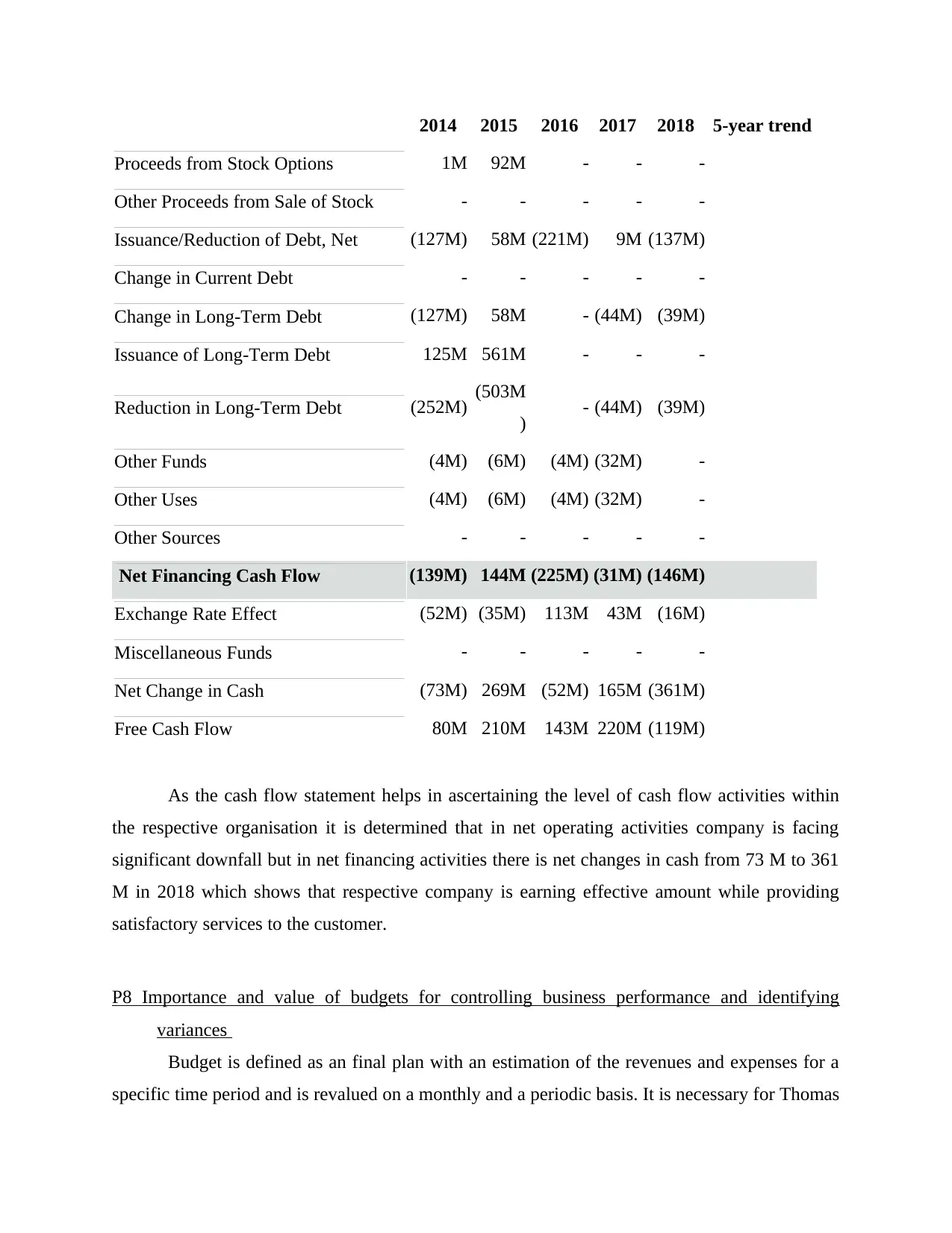
2014 2015 2016 2017 2018 5-year trend
Proceeds from Stock Options 1M 92M - - -
Other Proceeds from Sale of Stock - - - - -
Issuance/Reduction of Debt, Net (127M) 58M (221M) 9M (137M)
Change in Current Debt - - - - -
Change in Long-Term Debt (127M) 58M - (44M) (39M)
Issuance of Long-Term Debt 125M 561M - - -
Reduction in Long-Term Debt (252M) (503M
) - (44M) (39M)
Other Funds (4M) (6M) (4M) (32M) -
Other Uses (4M) (6M) (4M) (32M) -
Other Sources - - - - -
Net Financing Cash Flow (139M) 144M (225M) (31M) (146M)
Exchange Rate Effect (52M) (35M) 113M 43M (16M)
Miscellaneous Funds - - - - -
Net Change in Cash (73M) 269M (52M) 165M (361M)
Free Cash Flow 80M 210M 143M 220M (119M)
As the cash flow statement helps in ascertaining the level of cash flow activities within
the respective organisation it is determined that in net operating activities company is facing
significant downfall but in net financing activities there is net changes in cash from 73 M to 361
M in 2018 which shows that respective company is earning effective amount while providing
satisfactory services to the customer.
P8 Importance and value of budgets for controlling business performance and identifying
variances
Budget is defined as an final plan with an estimation of the revenues and expenses for a
specific time period and is revalued on a monthly and a periodic basis. It is necessary for Thomas
Proceeds from Stock Options 1M 92M - - -
Other Proceeds from Sale of Stock - - - - -
Issuance/Reduction of Debt, Net (127M) 58M (221M) 9M (137M)
Change in Current Debt - - - - -
Change in Long-Term Debt (127M) 58M - (44M) (39M)
Issuance of Long-Term Debt 125M 561M - - -
Reduction in Long-Term Debt (252M) (503M
) - (44M) (39M)
Other Funds (4M) (6M) (4M) (32M) -
Other Uses (4M) (6M) (4M) (32M) -
Other Sources - - - - -
Net Financing Cash Flow (139M) 144M (225M) (31M) (146M)
Exchange Rate Effect (52M) (35M) 113M 43M (16M)
Miscellaneous Funds - - - - -
Net Change in Cash (73M) 269M (52M) 165M (361M)
Free Cash Flow 80M 210M 143M 220M (119M)
As the cash flow statement helps in ascertaining the level of cash flow activities within
the respective organisation it is determined that in net operating activities company is facing
significant downfall but in net financing activities there is net changes in cash from 73 M to 361
M in 2018 which shows that respective company is earning effective amount while providing
satisfactory services to the customer.
P8 Importance and value of budgets for controlling business performance and identifying
variances
Budget is defined as an final plan with an estimation of the revenues and expenses for a
specific time period and is revalued on a monthly and a periodic basis. It is necessary for Thomas
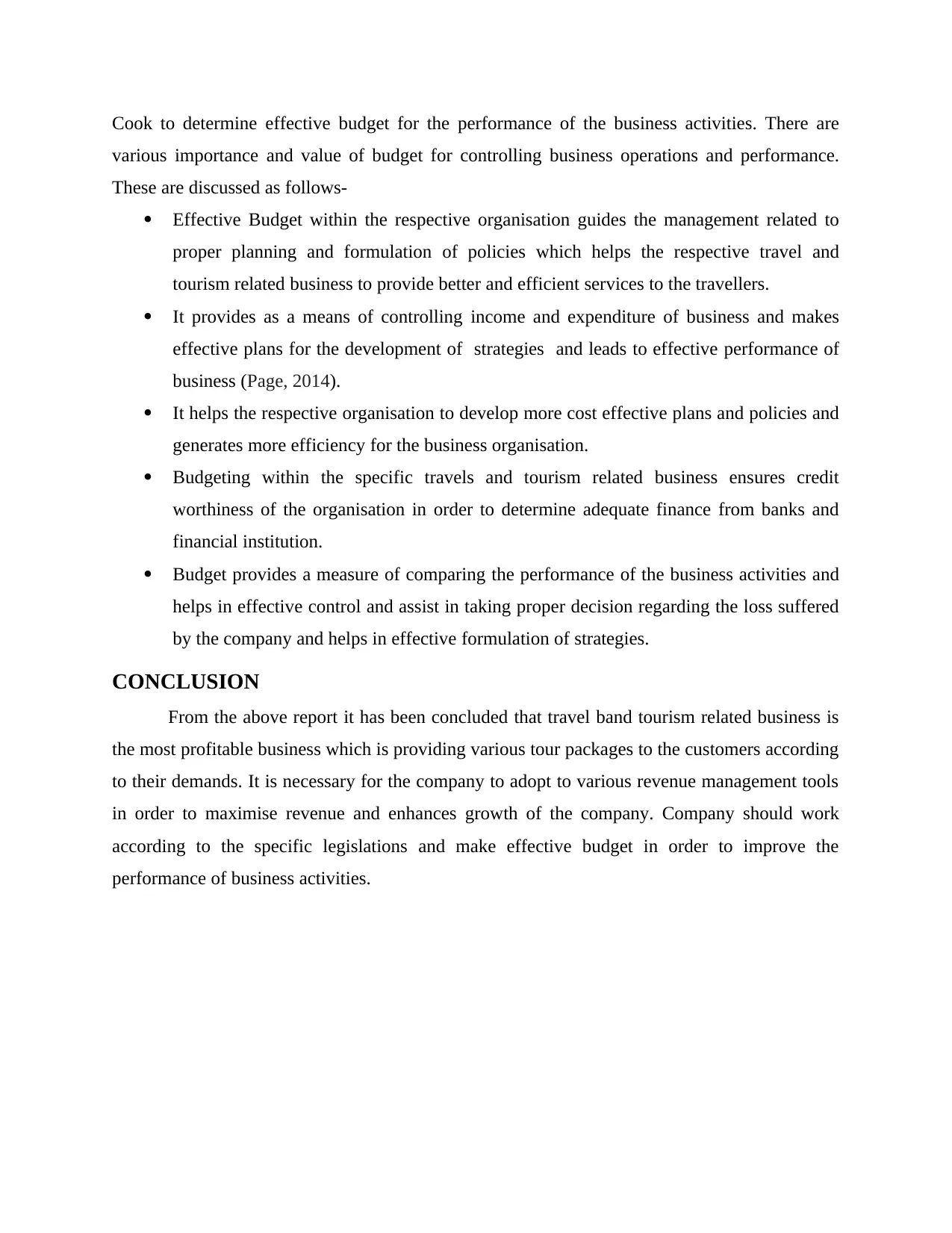
Cook to determine effective budget for the performance of the business activities. There are
various importance and value of budget for controlling business operations and performance.
These are discussed as follows-
Effective Budget within the respective organisation guides the management related to
proper planning and formulation of policies which helps the respective travel and
tourism related business to provide better and efficient services to the travellers.
It provides as a means of controlling income and expenditure of business and makes
effective plans for the development of strategies and leads to effective performance of
business (Page, 2014).
It helps the respective organisation to develop more cost effective plans and policies and
generates more efficiency for the business organisation.
Budgeting within the specific travels and tourism related business ensures credit
worthiness of the organisation in order to determine adequate finance from banks and
financial institution.
Budget provides a measure of comparing the performance of the business activities and
helps in effective control and assist in taking proper decision regarding the loss suffered
by the company and helps in effective formulation of strategies.
CONCLUSION
From the above report it has been concluded that travel band tourism related business is
the most profitable business which is providing various tour packages to the customers according
to their demands. It is necessary for the company to adopt to various revenue management tools
in order to maximise revenue and enhances growth of the company. Company should work
according to the specific legislations and make effective budget in order to improve the
performance of business activities.
various importance and value of budget for controlling business operations and performance.
These are discussed as follows-
Effective Budget within the respective organisation guides the management related to
proper planning and formulation of policies which helps the respective travel and
tourism related business to provide better and efficient services to the travellers.
It provides as a means of controlling income and expenditure of business and makes
effective plans for the development of strategies and leads to effective performance of
business (Page, 2014).
It helps the respective organisation to develop more cost effective plans and policies and
generates more efficiency for the business organisation.
Budgeting within the specific travels and tourism related business ensures credit
worthiness of the organisation in order to determine adequate finance from banks and
financial institution.
Budget provides a measure of comparing the performance of the business activities and
helps in effective control and assist in taking proper decision regarding the loss suffered
by the company and helps in effective formulation of strategies.
CONCLUSION
From the above report it has been concluded that travel band tourism related business is
the most profitable business which is providing various tour packages to the customers according
to their demands. It is necessary for the company to adopt to various revenue management tools
in order to maximise revenue and enhances growth of the company. Company should work
according to the specific legislations and make effective budget in order to improve the
performance of business activities.
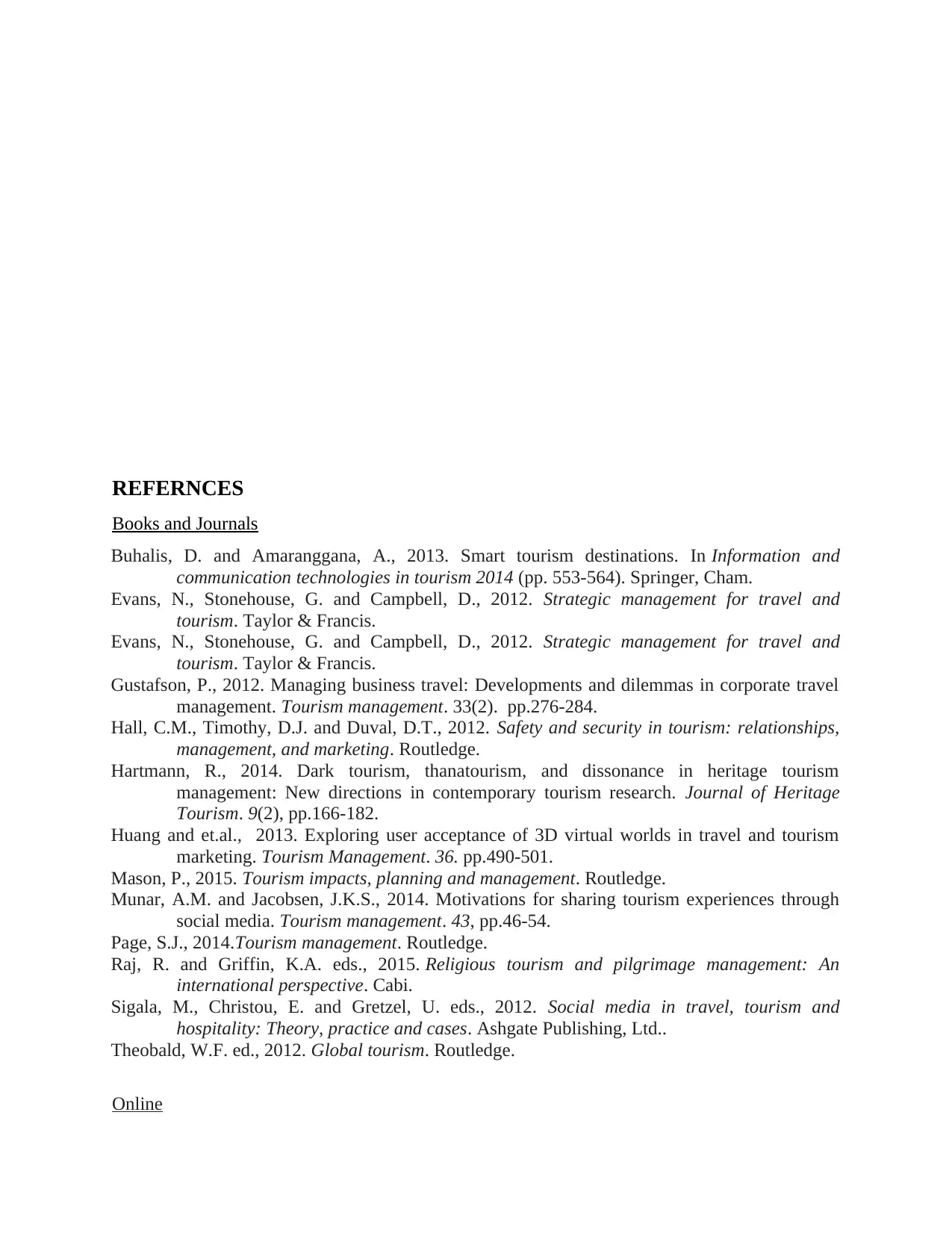
REFERNCES
Books and Journals
Buhalis, D. and Amaranggana, A., 2013. Smart tourism destinations. In Information and
communication technologies in tourism 2014 (pp. 553-564). Springer, Cham.
Evans, N., Stonehouse, G. and Campbell, D., 2012. Strategic management for travel and
tourism. Taylor & Francis.
Evans, N., Stonehouse, G. and Campbell, D., 2012. Strategic management for travel and
tourism. Taylor & Francis.
Gustafson, P., 2012. Managing business travel: Developments and dilemmas in corporate travel
management. Tourism management. 33(2). pp.276-284.
Hall, C.M., Timothy, D.J. and Duval, D.T., 2012. Safety and security in tourism: relationships,
management, and marketing. Routledge.
Hartmann, R., 2014. Dark tourism, thanatourism, and dissonance in heritage tourism
management: New directions in contemporary tourism research. Journal of Heritage
Tourism. 9(2), pp.166-182.
Huang and et.al., 2013. Exploring user acceptance of 3D virtual worlds in travel and tourism
marketing. Tourism Management. 36. pp.490-501.
Mason, P., 2015. Tourism impacts, planning and management. Routledge.
Munar, A.M. and Jacobsen, J.K.S., 2014. Motivations for sharing tourism experiences through
social media. Tourism management. 43, pp.46-54.
Page, S.J., 2014.Tourism management. Routledge.
Raj, R. and Griffin, K.A. eds., 2015. Religious tourism and pilgrimage management: An
international perspective. Cabi.
Sigala, M., Christou, E. and Gretzel, U. eds., 2012. Social media in travel, tourism and
hospitality: Theory, practice and cases. Ashgate Publishing, Ltd..
Theobald, W.F. ed., 2012. Global tourism. Routledge.
Online
Books and Journals
Buhalis, D. and Amaranggana, A., 2013. Smart tourism destinations. In Information and
communication technologies in tourism 2014 (pp. 553-564). Springer, Cham.
Evans, N., Stonehouse, G. and Campbell, D., 2012. Strategic management for travel and
tourism. Taylor & Francis.
Evans, N., Stonehouse, G. and Campbell, D., 2012. Strategic management for travel and
tourism. Taylor & Francis.
Gustafson, P., 2012. Managing business travel: Developments and dilemmas in corporate travel
management. Tourism management. 33(2). pp.276-284.
Hall, C.M., Timothy, D.J. and Duval, D.T., 2012. Safety and security in tourism: relationships,
management, and marketing. Routledge.
Hartmann, R., 2014. Dark tourism, thanatourism, and dissonance in heritage tourism
management: New directions in contemporary tourism research. Journal of Heritage
Tourism. 9(2), pp.166-182.
Huang and et.al., 2013. Exploring user acceptance of 3D virtual worlds in travel and tourism
marketing. Tourism Management. 36. pp.490-501.
Mason, P., 2015. Tourism impacts, planning and management. Routledge.
Munar, A.M. and Jacobsen, J.K.S., 2014. Motivations for sharing tourism experiences through
social media. Tourism management. 43, pp.46-54.
Page, S.J., 2014.Tourism management. Routledge.
Raj, R. and Griffin, K.A. eds., 2015. Religious tourism and pilgrimage management: An
international perspective. Cabi.
Sigala, M., Christou, E. and Gretzel, U. eds., 2012. Social media in travel, tourism and
hospitality: Theory, practice and cases. Ashgate Publishing, Ltd..
Theobald, W.F. ed., 2012. Global tourism. Routledge.
Online
Paraphrase This Document
Need a fresh take? Get an instant paraphrase of this document with our AI Paraphraser
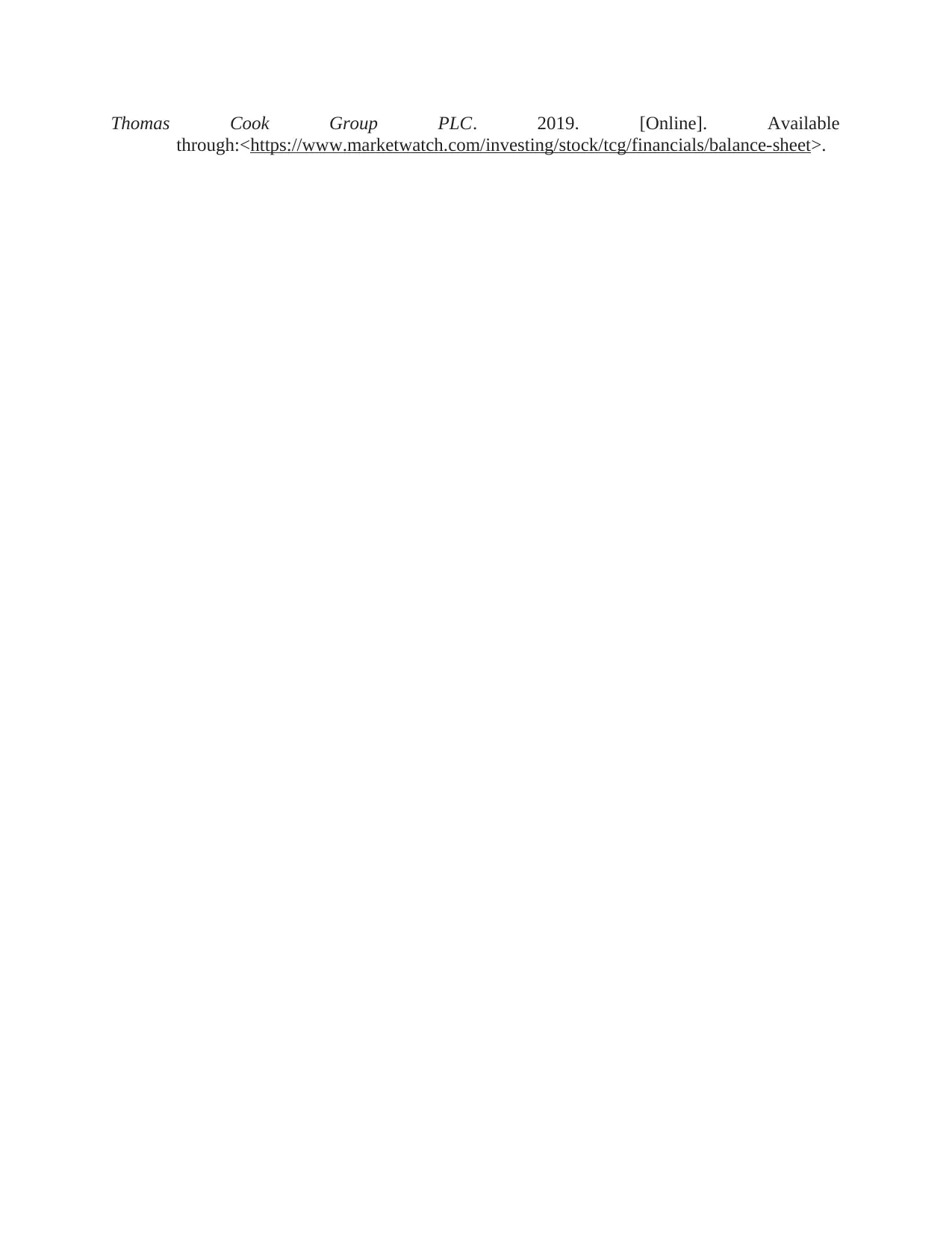
Thomas Cook Group PLC. 2019. [Online]. Available
through:<https://www.marketwatch.com/investing/stock/tcg/financials/balance-sheet>.
through:<https://www.marketwatch.com/investing/stock/tcg/financials/balance-sheet>.
1 out of 20
Related Documents
Your All-in-One AI-Powered Toolkit for Academic Success.
+13062052269
info@desklib.com
Available 24*7 on WhatsApp / Email
![[object Object]](/_next/static/media/star-bottom.7253800d.svg)
Unlock your academic potential
© 2024 | Zucol Services PVT LTD | All rights reserved.





